#Local Criminal Defense Attorney
Explore tagged Tumblr posts
Text
Choosing the Right West Palm Beach DUI Attorney: Tips for a Successful Defense
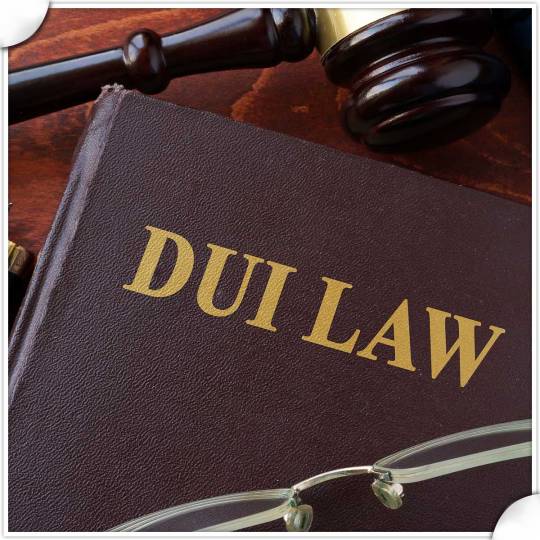
Summary:
Look for an attorney with experience in DUI defense.
Consider an attorney with a proven track record of success in similar cases.
Choose an attorney who will provide personalized attention to your case.
Look for an attorney who offers a free consultation to discuss your case.
Consider an attorney who is familiar with the local court system and judges.
Choose an attorney that you feel comfortable with.
If you've been charged with a DUI in West Palm Beach, choosing the right attorney is crucial to a successful defense. DUI charges have serious consequences, including fines, license suspension, mandatory insurance increases, probation, and even jail time. In this article, we'll provide tips on how to choose the right West Palm Beach DUI attorney for your case.
The Importance of Choosing the Right DUI Attorney
Choosing the right DUI attorney can mean the difference between a successful defense and a conviction. An experienced DUI attorney can provide guidance and support throughout the legal process, working to minimize the consequences of a DUI charge.
Experience and Track Record
When choosing a West Palm Beach DUI attorney, look for someone with experience in DUI defense. Consider an attorney with a proven track record of success in similar cases. A skilled attorney will know the best strategies to use in your case and can work to minimize the consequences of a DUI charge.
Personalized Attention
Look for an attorney who will provide personalized attention to your case. DUI charges are serious. You want an attorney who will take the time to understand your unique circumstances and build a defense strategy that works for you. Remember you get what you pay for in life, including attorneys.
Free Consultation
Choose an attorney who offers a free consultation to discuss your case. This will give you the opportunity to ask questions and get a better understanding of the attorney's experience and approach to DUI defense.
Familiarity with the Local Court System
Consider an attorney who is familiar with the local court system and judges. An attorney who is familiar with the local court system can provide insight into the judges and prosecutors involved in your case and can use this knowledge to build a more effective defense strategy.
By following these tips, you can choose the right West Palm Beach DUI attorney for your case and increase your chances of a successful defense.
Q&A FAQ:
Q: What are the consequences of a DUI conviction in Florida?
A: The consequences of a DUI conviction in Florida can include fines, license suspension, community service, mandatory increased car insurance, probation, and even jail time. The severity of the consequences depends on the circumstances of the case and any prior DUI convictions both in Florida and out.
Q: Can a DUI charge be dismissed?
A: Sure, it's possible for a DUI charge to be dismissed if the evidence against you is weak or there were errors in the arrest or testing process. An experienced DUI attorney can review the evidence in your case and determine if there are grounds for dismissal.
Q: What is the difference between a DUI and a DWI?
A: In Florida, the terms DUI (driving under the influence) and DWI (driving while intoxicated) are used interchangeably outside the courtroom to refer to driving under the influence of drugs or alcohol. Officially Florida law does not use the term DWI.
Q: Can I refuse a breathalyzer test?
A: In Florida, if you refuse a breathalyzer test, your license will automatically be suspended for at least one year. The length of the suspension depends on the number of prior refusals. Whether you refused or not cannot be changed. Do not dwell on this issue after the fact!
Q: What are some common defenses for a DUI charge?
A: Some common defenses for a DUI charge include challenging the legality of the traffic stop, questioning the accuracy of the field sobriety exercises or breathalyzer results, and arguing that the defendant's rights were violated during the arrest or testing process.
Q: How can a DUI attorney help with my case?
A: A DUI attorney can provide guidance and support throughout the legal process, including negotiating with prosecutors, reviewing evidence, and building a defense strategy. An experienced attorney can work to minimize the consequences of a DUI charge and help you navigate the complex legal system.
Q: How much does a West Palm Beach DUI attorney cost?
A: The cost of a West Palm Beach DUI attorney can vary depending on the attorney's experience and the complexity of the case. Some attorneys charge a flat fee, while others charge an hourly rate. It's important to discuss fees and payment options with your attorney before hiring them.
#Hire West Palm Beach DUI attorney#DUI lawyer near me#West Palm Beach DUI defense#Drunk driving lawyer#DUI defense attorney#Experienced DUI lawyer#Affordable DUI attorney#Local DUI lawyer#DUI defense lawyer in West Palm Beach#Criminal defense attorney for DUI#Expert DUI lawyer in West Palm Beach#DUI defense firm in West Palm Beach
0 notes
Text
You Are in Love Jazz/Cass
Jasmine Fenton let out a sigh as she followed behind her boss as they made their way across the large ballroom. It was the annual Wayne Charity Gala for Criminal Justice Reform and as a public defender at Gotham County Courthouse, Jazz was unfortunately obligated to be there rubbing elbows with rich, pretentious assholes. It was for a wonderful cause, and all of the money went to local nonprofit organizations that helped give people the life-saving resources that would keep them from reoffending or resorting to working for the Goonion as Jazz had heard it called.
When she had first graduated from Harvard Law, she hadn’t known what exactly she wanted to do. What kind of law she wanted to practice, who she wanted to help. And then Danny had told her about how bad Gotham was. After he had started working with Constantine and the rest of the Justice League Dark on the more magical problems, he had started to tell Jazz about all of the horrors of Gotham from when the bats called him there for assistance.
It was then that Jazz finally realized what it was that she was wanting to do. She wanted to help reform the horrible justice system that was the Gotham City justice system and help with the major crime that was going on there. So she had put in an application to be a public defender in Gotham County to help the most disenfranchised people of Gotham and she found her way to New Jersey of all places.
Four years later and the public defender’s office had been completely redone under the watchful eye of Jasmine Fenton and she had managed to make it work like a well oiled machine. She had helped partner with a few nonprofits who helped them work on their basic needs while the PD’s office focused more on helping them keep from going to prison or worse–Arkham.
It wasn’t a perfect system but it was getting better. So here she was, prepared to schmooze with the best of them to get more funding for all of the different organizations that were helping them reduce Gotham recidivism. For the first time in her life, Jazz found herself thankful for the lessons that she had received from Vlad when it came to trying to get people to give her money. Not that she would ever admit that to her godfather.
She plastered her most pleasant smile on her face as she floated through the ballroom, trying to not be self conscious of the fact that she was in a long, green ball gown that had already caused a few people to make comments about the fact that combined with her red hair was reminiscent of Poison Ivy. It was a little embarrassing but her girlfriend had told her multiple times that she looked good in it and that had her feeling a bit better. If her girlfriend thought it looked good, then it had to be.
She would never lie to Jazz.
Jazz was slightly suspicious that her girlfriend didn’t even know how to lie.
Teal eyes roved through the city as she eyed the other gala guests, looking for her next target. She really needed to find someone to chat with or else she was going to start looking a bit too awkward.
Then, her eyes landed on the most beautiful woman in the room and Jazz felt her stomach flutter a bit in anticipation as she made her way to Jazz.
Jasmine Fenton was a ruthless, cutthroat defense attorney. She scared Harvey Dent. Yet her girlfriend seemed to make her weak at the knees every time she so much as looked Jazz’s way.
Cassandra Wayne was the only daughter of Brucie Wayne, the playboy billionaire and host of their lovely gala for the night. Jazz had met her for the first time just two years prior when she had been forced to attend her first gala. The woman had been following Brucie around like a shadow, a pleasant, if not forced smile plastered onto her face as she followed the man around the room, sneaking glasses of champagne from her overly intoxicated father’s hand whenever she thought he had been drinking too much, or glaring menacingly at women who tried to approach the older man in attempts to get him to bring them home.
Then her eyes had landed on Jazz and she had given her the most genuine, beautiful smile that the redhead had ever seen. Jazz had found herself compelled to go over and talk to both Brucie and his daughter and it was probably the best decision she had ever made in her life. Bruce had managed to convince Cass to drift off with Jazz while he got into a long conversation with one of the DA’s who was also at attendance at that gala.
Which was fine with Jazz. The two ladies had found themselves chatting the rest of the night, trading stories, people watching, commiserating over the fact that they were forced to even be at a gala in the first place. And then as the night had come to an end, Cassandra had slipped Jazz a napkin with a phone number and a smiley face before she gave Jazz another one of those breathtaking smiles that had her swooning where she stood.
And really, the rest was history. The women had found themselves talking more and more, seeking one another out whenever they had the chance. Jazz had gone to see Cass’s ballet shows and Cass started to make weekly trips to the courthouse to make sure that the red head was eating properly and taking care of herself.
Somehow they had found themselves here. In a happy, comfortable relationship, living together in a nice brownstone in Upper Gotham and attending fancy galas together. Cass still followed her father like a shadow and Jazz still had to unfortunately kiss ass to a bunch of rich billionaires but sometime during the night they would find one another and get just a little too wrapped up in one another to even notice anyone else.
“Fancy seeing you here, beautiful,” a soft, polite voice said, as strong, calloused hands twined with Jazz’s dainty soft ones. Jazz looked down at her gorgeous, amazing, beautiful girlfriend and felt her cheeks go red like it was that first night all over again.
“I know, it’s almost like your father is hosting the charity ball,” Jazz said with a soft snort. Cass gave her that soft, secretive smile that always seemed to draw the older woman in.
Her kohl lined eyes rolled once as she glanced over at where Bruce was laughing loudly, throwing his arm over Oliver Queen’s shoulder as he laughed raucously, causing others to look over at him in thinly veiled disdain.
“Yes, he does enjoy coming to these,” Cass said, her nose crinkled ever so slightly. Jazz just gave her girlfriend a small smile.
“He seems to be really hamming it up tonight,” Jazz said with a laugh as her girlfriend just let out a tired sigh and shook her head. That was one of the fun parts of getting to know Cass, Jazz started to learn a bit more about all of the family and their treasure trove of secrets. She learned that Bruce Wayne wasn’t nearly as ditzy and arrogant as he let people think and was much more level headed and open. She had gotten to know each of Cass’s siblings as well and learn a bit more of each of them.
And then she had gotten to learn the real secret about the Waynes after dating her girlfriend for a year. She had learned about their nightly activities and had been more than excited to learn as much as she could about them. Not only that but then she got to listen to them tell her fun stories about her baby brother. Apparently he worked rather closely with Cass’s younger brother, Tim and the two caused more chaos than Danny had ever let her know about.
It was fun, getting to know all of the secrets behind her girlfriend, to learn every facet of who she was and how she came to be. How there were days when words were just too much for the shorter women, when days were so hard and difficult that she couldn’t seem to get out of bed. Then there were the days when her laugh filled their apartment along with the pitter patter of her feet as she danced along the kitchen to music only she could hear.
And Jazz found herself able to talk to someone who understood what it was like to grow up with just plain insanity. She felt more comfortable telling Cass about her childhood, opening up about the fact that the reason she was interested in justice reform was because her own parents had been thrown in prison when she had been just twenty years old after what they had done to Danny. Not to mention the years of neglect that they had endured under her parents' care.
Cass never looked at her like she was insane when she mentioned times where she had to beat down turkeys with a baseball bat. They found solace in one another, a comfort that Jazz had never felt before in her life. She found acceptance in Cassandra Wayne and she was addicted to it. In love with the feeling of being in love.
Cass treated Jazz like she was fine china, a delicate thing that needed to be treasured and loved. And Jazz made sure that Cass felt the same way, that Cass knew that she was loved and valued. That the shorted, hardened woman knew that she was more than just a weapon for other’s to use. That she could be more than just Black Bat.
That she could be whatever she wanted to be. That she was Jazz’s tiny dancer that she adored endlessly.
“Would you like to dance?” Cass asked, the corners of her eyes crinkled slightly with her smile.
“You just like showing off,” Jazz said with a roll of her eyes before taking Cass’s hand, watching the way her yellow ball gown seemed to swish around her as she led the taller woman to the dance floor.
“I like showing you off, yes,” Cass said simply before she rested her hand on Jazz’s waist, the other holding Jazz’s hand carefully. “How is it?”
“It’s fine,” Jazz said with a huff as she looked around at the other party goers. “We’re raising a lot of money already and we haven’t even gotten to the silent auction yet. I just hate having to play nice with all of these people.”
“Better than me,” Cass said simply as she allowed Jazz to twirl her around a bit. Jazz gave her a small smile and shook her head in amusement.
“You just have to smile and you have everyone here vying for your attention. You’re the favorite out of Brucie’s kids, you know,” Jazz told her with a small grin.
“Whatever. Tim’s the favorite,” Cass pointed out. Jazz just shook her head and dipped Cass down before pulling her back and giving the woman a soft kiss.
“Whatever you say,” she murmured, lips a hair’s breadth from Cass’s. “If it’s any consolation, you’re my favorite.”
Cass let out a hum, her eyes fluttered closed for a moment as she relished in the attention from the red head. “Everyone is watching.”
“Let them,” Jazz said, running her nose along Cass’s jawline for a moment before they went back to spinning and swaying and sashaying through the dance floor. “Isn’t that what you always tell me? Let them watch?”
Cass hummed. “Makes you more interesting,” she murmured. “Sometimes you’re scary, dancing makes you more approachable. More open.”
Jazz scoffed. “I’m approachable.”
“Intimidating,” Cass told her, pinching her side lightly. “Powerful women scare people. You’re powerful. Scarry. Unapproachable.”
“It’s not my fault that people are cowards and are intimidated by me,” Jazz grumbled. Cass just smiled and shook her head.
“No, but dancing makes you seem more approachable. More,” Cass paused and thought for a moment. “More human,” she finally said.
“I’m human,” Jazz argued.
“No, liminal. Big difference,” she said with a laugh. “Sometimes you stand too still, your eyes glow too much. Too strong, a little too other,” she said, smiling up at Jazz.
Jazz rolled her eyes and just gave her girlfriend another kiss. “Well, I suppose we can prove to everyone that I’m a non intimidating, kind, fully human person.”
Cass let out an excited giggle and allowed Jazz to spin her across the ballroom. The attorney just grinned as they took over the dancefloor, her love for her girlfriend bloomed in her chest.
#dpxdc#danny phantom#dp x dc#dc x dp#dp x dc crossover#dis writes#dis dreams#batman#dc x dp crossover#jazz Fenton#Jazz Fenton/ Cass Cain#femslash
158 notes
·
View notes
Text

What Happens When You Can’t Simply Arrest the Jews For Defending Themselves?
by Seth Mandel
The morning after Easter Sunday in 1903, Yehiel Pesker went to his shop at the Kishinev market to inspect for damage. The previous day, the early rumblings of a pogrom had unsettled the city. On his way back home, he saw about 200 Jews armed with clubs and even a few guns—the second wave of one of history’s most notorious pogroms would come that day and Jews wanted to be prepared. When the pogromists came there was a standoff, until the police intervened against the Jews and the deadly violence continued.
Although these Jews merely presented a desire to defend themselves should they be attacked, and although this was one brief moment on the second day of a three-day blood-riot that would shock the world, “local antisemites and their sympathizers,” according to historian Steven J. Zipperstein, tried to argue that this was an escalation by the Jews and therefore the victims were really to blame for the pogrom. Elsewhere in town, a nearly 60-year-old Jewish man fought off four attackers, who then spread the rumor that a Jew had murdered Christians. For some, then, a literal blood libel in the middle of an extended massacre was transformed into the origin story of the whole riot.
“In arguments made by defense attorneys at the trials of pogrom-related crimes, Sunday’s rioting was dismissed as a ruckus that would quickly have come to an end… had Jews not overreacted,” writes Zipperstein. “In this version it was the all-but-unprovoked aggression of Jews and subsequent rumors of attacks on a church and the killing of a priest that set in motion the unfortunate but, under the circumstances, understandable violence.”
That all may sound ridiculous, because few pogroms are better known than Kishinev and because it had such a profound effect on history: It shaped the perspectives of important Zionist figures and it alarmed the world, even becoming an element of the civil-rights fight in America as an example of why racial and ethnic minorities needed protection from the state enshrined in law.
But leave out the names of people and places, and you’d be describing the response to Hamas’s October 7 massacre. The Jews had it coming; the attacks were essentially an act of self-defense; it would’ve been a minor event had the Jews not escalated by defending themselves.
The Russian police director tried to argue at least for moral equivalence, based on these lies, between the Kishinev Jews and their murderers. You can hear a direct echo of this in Karim Khan, prosecutor at the International Criminal Court, filing applications for arrest warrants for both Israeli Prime Minister Benjamin Netanyahu and Hamas terrorist leader Yahya Sinwar: “if we do not demonstrate our willingness to apply the law equally, if it is seen as being applied selectively, we will be creating the conditions for its collapse.” That echo is arguably even louder in the New York Times, which describes the reactions to Khan’s stunt this way: “Mr. Khan’s decision to simultaneously pursue Israeli and Palestinian leaders was criticized by Israeli government ministers and Hamas alike. Both sides questioned why their allies had been targeted instead of their enemies alone.”
Ah yes, both sides. A month after the Hamas attacks, the author Sam Harris denounced this way of thinking on his podcast in a soliloquy that will stand the test of time. The key part:
Of course, the boundary between Anti-Semitism and generic moral stupidity is a little hard to discern—and I’m not sure that it is always important to find it. I’m not sure it matters why a person can’t distinguish between collateral damage in a necessary war and conscious acts of genocidal sadism that are celebrated as a religious sacrament by a death cult. Our streets have been filled with people, literally tripping over themselves in their eagerness to demonstrate that they cannot distinguish between those who intentionally kill babies, and those who inadvertently kill them, having taken great pains to avoid killing them, while defending themselves against the very people who have just intentionally tortured and killed innocent men, women, and yes… babies… If you have landed, proudly and sanctimoniously, on the wrong side of this asymmetry—this vast gulf between savagery and civilization—while marching through the quad of an Ivy League institution wearing yoga pants, I’m not sure it matters that your moral confusion is due to the fact that you just happen to hate Jews. Whether you’re an anti-Semite or just an apologist for atrocity is probably immaterial. The crucial point is that you are dangerously confused about the moral norms and political sympathies that make life in this world worth living.
And in Khan’s case, if you can’t or won’t differentiate between Hamas’s war and Israel’s, you possess a moral deficit that disqualifies you from any position of authority or responsibility over others.
More important, however, is the core idea behind this trend. For most of history you could simply punish Jews for defending themselves, for staying alive. A pathetic puffed-up prosecutor could watch in silence as Jews were murdered and then file charges against “both sides” as soon as a Jew picked up a club in self-defense. Because the law, you see, must be applied evenly. The world wasn’t going to do anything about Hamas, even after its demonic acts on October 7. A fair prosecutor must wait until there is a Jew to be put in the dock as well. That’s balance. That’s justice.
Karim Khan may be a feeble clown, but he makes an airtight case for the existence of the State of Israel.
72 notes
·
View notes
Text
If Jason Todd really wants to kill the Joker, he should become a prosecutor.
Gotham CITY (emphasis added) makes no sense to me. It is the only CITY in all of DC comics where a supervillain goes to an asylum and not prison. Almost every supervillain goes to Arkham for criminal insanity instead of prison. Blackgate exists. Iron Heights exists. It's so bad that the idea of Bruce Wayne beating up the mentally ill became such a prevalent misconception of the character and Arkham became a shorthand for Gotham's supermax prison.
In the United States, there are four major tests for criminal insanity or not guilty by reason of insanity defense.
The M'Naghten Rule, Irresistable Impulse, Duhram Rule, and the Model Penal Code. Each STATE in the country uses at least a variation of this. Without getting into the weeds of them, the main takeaway is that they test wether:
1. The defendant had a mental illness or defect.
2. The mental illness or defect made them unable to conform to the law.
3. The mental illness or defect makes them unable to appreciate the wrongfulness of their action.
Only a handful of Batman villains fall under these criteria. Off the top of my head, Harvey Dent and the Ventriloquist. Characters like Ivy, Freeze, Manbat, or Bane don't fall into any of these criteria.
Joker does not fall in these criteria either. He knows what does is wrong. He isn't compelled to do what he's doing because of his mental illness or defect if one such exists. If Jason wanted him dead, he could just be a prosecutor and argue against Joker's criminal insanity.
But what about him breaking out?
That's why I highlighted the words City and State. These laws on what defines Criminal Insanity are either in State Statutes or Federal ones. There are no local city ordinances that define criminal insanity because the State legislature controls that. That means if Washington State follows the Model Penal Code, then Seattle applies it the same as Spokane.
Look at every city in the DC Universe. Villains go to prison, never asylums. It only ever applies in Gotham. In some versions, Gotham is across the bay from Metropolis. So, assuming they share a stare, then Metropolis should be sending people like Luthor, Toyman, and Livewire to an asylum too since their laws for what criminal insanity is should be the same as Gotham's (same state and all). But no. Gotham is a legal anomaly.
Jason as an attorney can advocate for a uniform application of State statute. Maybe even convince the State to appeal the trial court's judgment regarding Joker's defense.
One could argue that Gotham is corrupt. Sure. But there's no business sense for the local crime families to lobby for all the costumed freaks to go to one easily-breakable asylum instead of prison. Cobblepot being sent there makes sense in that reading, but Joker?! Plus, we're talking about a whole State, not a just a city. So it'd be unlikely that a handful of Gotham crime families can convince the State to let Joker go to Arkham. Especially if the State can somehow resist Luthor enough to send him to prison.
But how does this kill the Joker? The Death Penalty. Joker would be more than eligible for it. Although, the Death Penalty does take a long time before it gets actually conducted.
I just think it's a lost opportunity not to have a Batman legal drama where Jason becomes a prosecutor hellbent on sending the Joker, and all other villains, to prison. It would give Bruce a moral dilemma where on hand, Jason is doing everything by the books, but his intent is to kill others using the death penalty. What should Bruce do? Should Batman intervene? Should Bruce lobby for the removal of the Death Penalty? Should Bruce provide Joker with legal counsel to combat Jason?
95 notes
·
View notes
Text
Pitch for a reimagining of Ace Attorney:
1) The game’s title
ACE ATTORNEYS
2) What’s the major reimagining?
Instead of a detective game, the game is choice-based along the lines of Telltale (like Walking Dead) and Quantic Dream (like Detroit Become Human). So you can actually lose the case and still finish the game.
Also, instead of different episodes with its own case, we have three cases that are played out simultaneously. We switch off between the 3 protagonists, just like Detroit Become Human.
Lastly, this’ll be more realistic than the original games. For this write-up, I’m using my own personal experience as a lawyer-in-training.
3) Storylines
(Note: Keep in mind, all these storylines are happening simultaneously with each other. The game switches POVs)
Storyline A: Local fortune-teller Maya Fey has been arrested for the murder of her older sister, Mia. Maya hires defense attorney Phoenix Wright, who also brings on a co-counsel, Franziska von Karma, who recently passed the bar (reference to OG Franziska being really young). The prosecutor is Miles Edgeworth, who has no prior connection to Franziska and Phoenix in this reimagining.
Storyline B: Phoenix Wright is currently going through a bitter divorce against his wife, Dahlia Hawthorne-Wright. They are fighting over everything, such as ownership of the Wright Law Firm, their house, and all their other assets. Phoenix is represented by divorce attorney Apollo Gramarye while Dahlia is represented by divorce attorney Klavier Gavin.
Storyline C: Apollo’s sister, Trucy Gramarye, is a celebrity magician with her own Las Vegas show. Recently, she’s sued a copycat magician named Rayfa Padma Khura'in, who she alleges stole her entire routine. Trucy hires entertainment/IP lawyer Simon Blackquill, who brings along his newest attorney Athena Cykes since she just passed the bar and needs experience. In response, Rayfa hires her own attorney, Nahyuta Sahdmadhi (side note: based on the real life Penn and Teller case).
So we got 3 main cases in different fields; criminal, divorce (family), and intellectual property.
4) The protagonists (should be obvious)
* Phoenix Wright: protagonist of the Maya Fey murder storyline
* Apollo Gramarye: protagonist of the Phoenix Wright divorce storyline
* Athena Cykes: protagonist of the Trucy Gramarye copyright infringement storyline
5) Other major characters (not a complete list)
* Maya Fey: A local fortune-teller and the main client of Storyline A
* Mia Fey: Maya’s older sister and the victim of Storyline A
* Franziska von Karma: Phoenix’s co-counsel and the deuteragonist of Storyline A (she fulfills the role of “assistant”, but only because she’s a junior attorney helping the senior)
* Miles Edgeworth: The prosecutor and main antagonist of Storyline A (main antagonist since you don’t actually find the supposed real killer, your goal is ONLY to get an acquittal for Maya)
* Richard G. Sho: The lead detective of the Fey murder case
* Dahlia Hawthorne-Wright: Phoenix’s wife who he’s getting divorced from and the main antagonist of Storyline B.
* Iris Hawthorne: Dahlia’s twin sister who plays a major role in the divorce proceedings.
* Klavier Gavin: Dahlia’s attorney and the secondary antagonist of Storyline B.
* Ema Skye: The accountant working with both Phoenix and Dahlia when it comes to determining how to split their community property (because she’s “scientific”)
* Trucy Gramarye: Apollo’s sister and a celebrity magician working in Las Vegas. She is the client of Storyline C.
* Simon Blackquill: Athena’s senior attorney
* Rayfa Padma Khura’in: A copycat magician who is sued by Trucy for infringement. She is the main antagonist of Storyline C.
* Nahyuta Sahdmadhi: Rayfa’s attorney and the secondary antagonist of Storyline C.
6) How the stories could play out depending on the player’s choices
* Maya could either be acquitted or deemed guilty. That being said, it’s never made clear whether or not Maya is actually innocent, unlike the original games.
* Phoenix could either lose a lot in the divorce settlement or Dahlia could lose. This storyline is more to determine whether or not Phoenix has a happy or sad ending.
* Trucy could either successfully shut down Rayfa’s show or Rayfa could continue to perform. Just like Maya’s story, it’s not made clear whether or not Rayfa intended to steal Trucy’s performance or if it was just an unfortunate coincidence.
7) Miscellaneous storyline stuff
* A plot twist in the Fey murder case could be that the Feys were deep in debt and Maya may have murdered Mia for insurance money. Maya could say she had no knowledge of the insurance money, which the player can choose to believe or doubt.
* A plot twist in the Wright divorce case could be that Phoenix was cheating on Dahlia with Dahlia’s twin sister, Iris (who is a nun in this reimagining). This could be a major factor in who ends up prevailing in the settlement.
* A plot twist in the Trucy copyright case could be that Rayfa and Trucy were friends when they were starting out as amateur magicians. This could be a major factor in determining whether or not Rayfa knew about the details of Trucy’s magic tricks.
* Obviously, the storylines do cross over with each other. Apollo visits his sister which leads to him meeting Athena, Phoenix has to deal with both the murder case and his own divorce, Athena could learn about Phoenix through Apollo and Trucy, etc.
#ace attorney#phoenix wright#apollo justice#athena cykes#maya fey#mia fey#franziska von karma#miles edgeworth#dick gumshoe#dahlia hawthorne#sister iris#klavier gavin#ema skye#trucy wright#simon blackquill#rayfa padma khura'in#nahyuta sahdmadhi#phoenix wright ace attorney#apollo justice ace attorney#ace attorney phoenix wright#gyakuten saiban#capcom#aa#ace attorney apollo justice#ace attorney fandom#trucy gramarye#spirit of justice#dual destinies#trials and tribulations#ace attorney justice for all
26 notes
·
View notes
Text
Criminal Law Basics incoming:
This is why the standard for proving guilt in a criminal court is Beyond a Reasonable Doubt. There is a ton of discussion regarding what Reasonable Doubt is*, but in general it is the highest burdan of proof that exists in the US Justice system. When creating this standard of proof, the idea was that circumstantial evidence and/or a lack of evidence can be twisted to imply guilt, which would lead to more innocent people being unfairly prosecuted. In theory, the prosecutor has the burden of proof because we should be absolutely certain the the person that we're sending to jail/prison/death is actually guilty. Defense attorneys spend a lot of time working on the best ways to describe reasonable doubt to a jury to help increase the chances of a not guilty verdict.
In this instance, it would be up to the prosecutor to show evidence that the Loam's received this money, it is not the Loam's responsibility (via their attorney**) to provide evidence that they did not receive the money. Sklonda's argument would be likely focus on the prosecutors and cops failing to meet this standard by not providing this key piece of evidence.
Also, I know this is done for story purposes, but this is all flagrant disregard for attorney client privilege, which doesn't go away just because the client died.
*We actually just got a ton of cases back from an appeal decision that determined that judges in our state were using an incorrect analogy to describe reasonable doubt to jurors. On that basis a lot of cases have to be re-tried because the jury wasn't applying the correct standard. That's how important this is.
**Another interesting legal fact, if both of the Loams were being charged with the same crime, they would not both get the same attorney. They would be what is known as co-defendents, and at least where I work, one of them would wind up with a private attorney who is paid for by the state due to the public defender's office having a conflict of interest. This is basically because in theory the best defense for either one of them may be to blame the other one, and so one attorney cannot act in the best interest for both of them. If they both got their own attorney and decided to work together to prove both of their innocence, that's totally fine, but there would be more of a process to ensure that no impropriety was going on. Again, I know this is for story purposes, but just a little fun fact from your local public defender - admin assistant.
#not legal advice#dimension 20#dimension 20 spoilers#fantasy high#fhjy#fantasy high junior year#pd life
35 notes
·
View notes
Note
kc + caroline has MANY complaints about klaus but her biggest one is that the only time he responds to her follow up emails is to ask whether something is illegal
Per My Last Email || Klaroline
Weirdly canon-esque, and I have no defense. But we all know Klaus would be Caroline's neediest client.
.
Dear Mr. Mikaelson:
Per the agreement you signed, my services have been retained for legal representation on your accumulated traffic tickets ONLY. Please note that these emails fall under attorney-client privilege, but you should still avoid excessive details that would test my standing as an officer of the court. I trust that you will respect my professional boundaries, as difficult as that will be for you. To make sure I have all the relevant information at hand, please forward me the details of your current ID, vehicle descriptions, and all license numbers.
As your court date is tomorrow, please respond as soon as possible. Otherwise, I would highly recommend paying your tickets before 9 a.m. via the online portal. My retainer fee, however, is nonrefundable.
ID, vehicle descriptions, and license numbers, ASAP.
Best,
Caroline Forbes Salvatore
Attorney, MF Group
.
Sweetheart, settle a bet for me. Kol insists his baseball bat is considered a deadly weapon, but surely it's just the force with which he can wield the bat that makes it deadly - therefore, its presence alone cannot be considered "assault with a deadly weapon."
A speedy answer would be appreciated, I just noticed the local bar installed a security camera that may limit your legal arguments after the fact.
x
.
And don't think I didn't notice the "Salvatore" in your signature.
I did.
x
.
Dear Mr. Mikaelson,
My married name is registered with the state bar association and a matter of public record. In fact, my ability to practice in Louisiana is predicated on the fact that "Caroline Forbes Salvatore" holds a valid law degree and active license. If you have a problem with that, please feel free to retain other representation.
That said, I do want to remind you that I may advise on hypothetical legal scenarios, but will not abet any illegal activity such as assault with a deadly weapon. The threatening manner in which you imply your brother might wield a baseball bat, hypothetically, would be enough to enhance any assault charges possibly caught on camera.
As your lawyer, I don't recommend putting these hypotheticals in writing, and I really don't recommend letting Kol loose on New Orleans with a bat. Hypothetically, the whole city has cameras and it's a miracle certain activities haven't come to light. Yet.
Since you failed to send me the necessary details before your court date, I asked Elijah. You're welcome for getting the parking tickets dismissed, by the way, even though your behavior in court was detrimental to your case. The judge was not amused by your sense of humor, and neither was I. To prevent a repeat performance, I would suggest storing your luxury sports car in your massive compound instead of literally the middle of a pedestrian plaza. Just a thought.
Elijah has also taken care of your court fees and my incidentals since I had to void your last payment. Next time, please just pay the invoice. You don't tip your lawyer.
Best,
Caroline Forbes Salvatore
Attorney, MF Group
.
Love - quick question. Rebekah is throwing a bit of a tantrum and stole the doppelgänger blood I had stored. Is this a civil suit situation, or can I press criminal charges? Honestly, I think she'd have a lark in prison, but I think the inconvenience would be consequence enough for her to feel my ire.
x
.
Mr. Mikaelson,
Again, I'm sure this is a hypothetical situation where your sister, who lives in your shared family domicile and therefore has rights to whatever is stored inside, takes something of no actual value, such as human blood stored for medical study and nothing else, then - hypothetically - a grown man with substantial resources like yourself can surely see that neither a civil suit nor criminal charges would be wise to file. None of those details of a...supernatural...sort would belong in the public record.
Not to mention, sending your sister to prison would only get me and several other people killed.
Hypothetically.
Seriously, I'm too busy for this, and I'm not even on retainer anymore. I will be sending Elijah an invoice for this email communication.
Best,
Caroline Forbes Salvatore
Attorney, MF Group
.
I've wired a retainer fee directly to your account. And since you're on the payroll, I have some paperwork to go through. Working dinner? I'll buy.
x
.
Caroline: Klaus, you cannot send me a million dollars in a personal check.
Klaus: Clearly, I can. Dinner?
Caroline: ...
Caroline: ...
Klaus: I'm thinking Italian.
Caroline: If you think this counts as a retainer fee, I do not have the time to explain how wrong you are, but I will if I have to. To be clear, that is a threat, and you know I will follow through, complete with slide deck and appendices. If you would indeed like to retain my services for the family, Elijah and I have already worked through an initial contract with LIMITS, you absolute ass. All official business will go through him, I swear, or you will regret it.
Caroline: Again, that is a threat.
Klaus: So, see you at eight?
Caroline: ...
Caroline: I'm donating the money you sent.
Caroline: But yeah, Italian sounds good.
Klaus: Change your email signature.
Caroline: Don't push it.
51 notes
·
View notes
Note
omg can I ask about ur minyard ocs??? 👀👀
YES I CAN (and sorry for taking so long)
I am still undecided on if the Minyard twins (pt 2) will be part of my oc canon but they have certainly existed in my head for a hot minute (made them 3 years ago and forgot about them)
ig I should probably include tws. Nothing in detail but mentions of abuse, suicide, and SA
Sawyer Minyard
she/her
31
4'11
criminal defense attorney
has never played a sport in her life and doesn't plan to start
aroace
audhd combo + chronic depression
Saide Minyard
they/them (will respond to any but they/them is preferred as their gender can best be describe as "idk a blob of energy or whatever")
31
5'1
tattoo artist
played exy throughout high school and college but had no interest in going pro
played as a striker
has a bachelor's degree in psychology, never got their masters
also has the audhd combo + bipolar
Unlike the other set of Minyard twins these two were never separated, though Tilda did give them both up. Do I remember if it was mentioned how old Tilda was when she had Aaron and Andrew? No. So we're smudging the timeline however we need to for this like 10-ish year age gap between both sets of twins
Saide and Sawyer are obviously not identical if you read their height difference. And Saide will probably hold onto being the tallest Minyard sibling for the rest of their life
Saide and Sawyer for the first half of their lives were raised by a very loving foster mother who decided to file for permanent guardianship when they were 7 but due to some vague legal trouble that I haven't developed yet it falls through and the two end up being removed from her home
Thankfully the two stay together but they end up bouncing around the system for awhile and they both grow angry of it. For Sawyer this manifests in her throwing herself into school, an obsession with the justice system, and an anger with law enforcement (girl hates cops with a passion). For Saide it's finding any way to get out of their head. Parties, drugs, sex. Not all of it consensual. A lot of heavy and unhealthy self medication.
They split up for the first time ever for college. Sawyer moves across the country, a full ride with a good school that should get her into a good law school. Saide stays in state, a full ride playing exy, and they figure they'll take what they can get.
They both start receiving help in college. Sawyer attempts suicide for the first time at 21 years old as the contact with her sibling has grown more inconsistent, she has few friends, and she finds herself struggling to keep up with certain required classes she feels no passion for. She starts going to therapy afterwards but receives no diagnosis.
Saide gets diagnosed with ADHD and bipolar II their sophomore year after an outburst at a teammate, followed by three days of them being missing (out getting high and drunk and having sex they weren't fully aware was happening. crashing on friends couches and in their cars) and them returning to college with the following crash and depressive episode. They start trying different medication, stop drinking and doing drugs (with a few relapses on the way despite their insistence that they were never an addict), and started seeing a counselor provided by their colleges mental health service.
Junior year is when Saide starts experimenting with their gender. They go from he/him to he/they to she/they to she/he/they back to he/they and then they/them. That same year they start their tattoo apprenticeship while working toward their psych degree.
Sawyer gets her polisci degree, Saide gets their psych degree, and Sawyer gets accepted to an amazing law school (haven't decided which one cause y'all I have beef with Ivy League's and shit). They're roommates while Sawyer goes to law school. They both move again and get an apartment together. Saide gets a job with a local tattoo place and Sawyer is obviously a full time student. They're pretty cramped in there but they make it work
It's not until Sawyer either is a practicing lawyer or around the time she's taking the bar that the two find out about Andrew and Aaron. They've never had reason to think about other siblings. And obviously Andrew and Aaron had no reason to think they existed. But maybe something comes up with Nicky's adoption process for the two of them and the connection ends up being made
They're distant. Obviously neither of them can pack up and move again to take care of two siblings they don't even know. But there's a small effort made. Sawyer will always call Aaron back. If she's getting home at 3 am after sorting through piles of clients paperwork. Saide writers letters that he's 90% sure Aaron doesn't read and that Andrew throws straight in the trash. But they know they're there. It's probably not until Aaron and Andrew are in college and the events of the books starts going down that they really get connected. Because I'm sorry to Sawyer Minyard, vcious criminal defense attorney, who has to get the phone call that her brother killed a man and no it's not the one she thinks it is.
And this is getting long but yeah that's a bit about them
22 notes
·
View notes
Text
A Grants Pass city ordinance requires homeless residents living in vehicles to move every 72 hours, and police require anyone living in parks to move as often as is allowed by state law, which is also every 72 hours. City code bars anyone from sleeping in public spaces or using sleeping materials for the purpose of maintaining a temporary place to live under threat of criminal and civil penalty.
[...]
The Supreme Court’s decision in the case out of southern Oregon, expected in June, will broadly impact how local governments write homelessness policy in the United States.
Since the Supreme Court took up the case in January, Democrat and Republican governments, district attorneys and business associations submitted amicus briefs arguing a 2022 Ninth U.S. Circuit Court of Appeals injunction removes necessary tools for enforcing laws against homeless residents sleeping on public property.
A host of organizations submitted amicus briefs in support of counsel representing homeless residents, saying laws punishing individuals for being homeless are cruel and unusual. The briefs also argued the laws do nothing to solve the homelessness crisis and will likely exacerbate the issue.
[...]
Referring to the state law, Jackson asked about “constitutional avoidance,” a legal doctrine that would allow the Supreme Court to decline to render a decision on the constitutionality of the Grants Pass ordinance. Roberts appeared to also question the court’s responsibility, asking why “these nine people are the best people to judge and weigh those policy judgements.”
The lower court’s decision will stand if the court decides not to issue a ruling as a matter of constitutional avoidance. Kelsi Corkran, Georgetown Law Supreme Court director and counsel for the class of homeless residents, told the court she would have no issues with that outcome.
If the court determined the ordinance does not violate the Eighth Amendment because Oregon has a necessity defense, the burden of proof would fall on each homeless individual to show a court they were sleeping outside for a reason, each time they received a citation.
[...]
“Ending homelessness requires collaboration and buy-in,” Rabinowitz said. “That cannot happen when the government is focused on throwing away people's stuff and throwing folks in jail.”
Tickets can impact credit scores, making it more difficult for people to be accepted into housing, and a criminal history also creates significant barriers.
“All of these things break connections and displace people from their chosen communities,” Rabinowitz said. “They all make homelessness worse.”
There is a broad range for what the Supreme Court could ultimately decide, Rabinowitz said. It could uphold the 9th Circuit’s decision saying civil and criminal punishments against homeless residents for being homeless are cruel and unusual. It could say people can be fined but not arrested, or it could overturn Martin v. Boise. While there appeared to be little appetite for it in the courtroom, the court could go so far as to say it has wrongly interpreted the Eighth Amendment in cases like 1962’s Robinson v. California. That could make way for laws criminalizing other involuntary statuses.
Rabinowitz said in the best-case scenario, the Supreme Court will set a bar — albeit a low bar — saying homelessness cannot be criminalized. People still need a place to go, regardless of the court’s decision. Until the support systems are in place to keep people from becoming homeless, the crisis will continue, according to Rabinowitz.
“Homelessness is a choice made by our elected officials every day when they fail to fund housing,” he said.
8 May 2024
#this is from the paper that has been following this case for the past six years since it started#and that covers poverty and homelessness and social justice issues generally in portland and oregon#so as far as i can tell (confirmed by the scotus website) scotus hasn't made a decision (or decided not to make a decision) yet#but is expected to do so this month#homelessness#lawsuits#oregon#scotus#my posts
22 notes
·
View notes
Text
Soup packet integration
“Still he lifts the mallet, still he may draw the sword, still he might speak out for a cause he knows is right”
July 19. From: A Year With Hadiz: by Daniel Ladinsky
(My margin note to the above: July 19, 2017)
Zoe wrote that I have abandoned the people of my class for the people of the street and of the jail. This is wrong for her. I lift the mallet of a touch of the soul. It’s soup packet integration.
I had an E unit meeting with Charles last night in the Stanislaus County Detention Center (jail) .
Charles told me during my visit with him in the jail that he had offered a new E unit inmate soup packets. The new guy was untrusting and turned Charles down. The next day, the new guy asked Charles “Do you still have those soup packets?”Charles still had them and gave them to his new friend.
After being released, his new friend wrote to Charles and put money on Charle’s books.
End of entry
Notes: 7/19/2024
From March of 2017 until late October of that year, I became pretty heavily involved with having encounters with the homeless. The encounter could involve giving them a bag containing food, socks and toiletries. On some occasions, I let the homeless man stay in my house with me for days or for a few weeks. I also was continuing to see my clients in the local jail. I’m a criminal defense attorney. I had told my sister Zoe about my homeless encounter and jail adventures. She wrote me a letter expressing her disapproval.
Something as ordinary as soup packets can be valuable when you are in jail. They come from the commissary. You have to have money on your account , or, on your books as it is referred to by those in jail, in order to obtain the packets from the commissary.. When Charles (not his real name) offered his soup packets to the new inmate, that was actually a significant gesture of friendship. Which, his new friend acknowledged when he was released by writing to Charles and putting money on his books. The men had an encounter. Both were healed by the gesture of the other.
And, so was I when I had the above mentioned encounters with the homeless and the jailed the experiences healed me from the damage done by the culture of comfort.
#journal#writing#journaling#homeless work#homelessness#criminal defense#attorney client relationship#inmate jail life and culture#the home;less encounter#July 19#2017#Brother Sister relationship#class distinction in America#A Year With Hafiz by Daniel Ladinsky
12 notes
·
View notes
Text

[sign on a local bar in Milwaukee]
* * * *
LETTERS FROM AN AMERICAN
July 15, 2024
HEATHER COX RICHARDSON
JUL 16, 2024
This morning, after a day of Republicans insisting that it is political polarization to suggest that Trump is a danger to our democracy, U.S. District Judge Aileen Cannon, who was appointed by Trump in the last days of his presidency, dismissed the classified documents case against the former president. She wrote that “Special Counsel Smith’s appointment violates the Appointments Clause of the United States Constitution.”
Other federal courts have tested this argument and dismissed it, but Supreme Court justice Clarence Thomas, whose wife Ginni was part of the attempt to overturn the results of the 2020 presidential election, suggested earlier this month that it could be the basis for getting rid of Jack Smith. Cannon cited Thomas repeatedly in her decision.
When he left office in January 2021, Trump took with him to Mar-a-Lago hundreds of pages of classified national security documents, some of which bore the highest level of classification. The National Archives and Records Administration (NARA), where by law presidential papers must be deposited, noted that many documents were missing from the materials Trump released to them and, in May 2021, emailed Trump’s lawyers to get them back.
When his lawyers tried to push him to do as the law required, they told FBI investigators, Trump answered: “It’s not theirs, it’s mine.” Finally, in December 2021, after Trump had personally gone through the documents, a Trump representative told NARA that they had found “some records,” and in January 2022, NARA retrieved 15 boxes from Mar-a-Lago. Archivists found more than 150 documents marked classified, making up hundreds of pages of classified national security information.
By April the Justice Department had convened a grand jury to investigate Trump’s removal of the documents. Trump’s lawyers tried to keep those documents out of the hands of the Federal Bureau of Investigation (FBI) by claiming they were covered by executive privilege, but in May 2022, NARA gave the FBI access to the records. In June 2022, Trump representative Christina Bobb certified that “a diligent search” at Mar-a-Lago had turned up nothing more and that they were returning “any and all documents” they had found. Concerned about the sheer number of documents turning up, the Department of Justice subpoenaed security video tapes, which showed people moving the documents.
Federal officials obtained a search warrant for Mar-a-Lago. When they executed it in August 2022, they found 13 more boxes with classified documents: a total of more than 11,000 government documents and photographs. They also found 48 empty folders labeled “classified,” but they did not check a locked closet on which Trump had recently changed the lock, or a “hidden room” in Trump’s bedroom. They found that the boxes, which contained the most valuable intelligence of the United States government, had been stored haphazardly in public areas, including a ballroom stage and a bathroom.
In November 2022, after Trump announced his presidential candidacy—an early announcement that many thought was an attempt to avoid criminal prosecution—Attorney General Merrick Garland appointed a special counsel to oversee the two federal investigations that touched on the former president, thus deliberately moving those investigations outside the department so they could not be seen as part of the presidential race.
In June 2023 a federal grand jury indicted Trump on 37 criminal counts under the Espionage Act, including scheming to conceal documents; three more charges were added the following month. Trump allegedly compromised national security documents from the Central Intelligence Agency, the Department of Defense, the National Security Agency, the National Geospatial Intelligence Agency (surveillance imagery), the National Reconnaissance Office (surveillance and maps), the Department of Energy (nuclear weapons), and the Department of State and Bureau of Intelligence and Research (diplomatic intelligence). He was a one-man wrecking ball, aimed at our national security.
The case fell randomly to Cannon, who has appeared to be trying to delay the case since it came into her hands. Today, she threw it out altogether.
Former attorney general Eric Holder called Cannon’s dismissal “so bereft of legal reasoning as to be utterly absurd.” Legal analyst Mark Joseph Stern called it “an extreme outlier view with no basis in precedent” and noted that “Cannon’s indefensible opinion will still serve its purpose of delaying this trial indefinitely.”
Global politics scholar Brian Klaas wrote “Trump appoints judge. Trump does something that virtually all legal experts—including Trump’s own former Attorney General—see as a clear-cut felony. Judge that Trump appointed dismisses case.” Washington Post global affairs columnist Ishaan Tharoor wrote: “if this happened in another country, the DC establishment would immediately point to the erosion of the rule of law and the independence of the judiciary.”
Special Counsel Jack Smith has said he will appeal Cannon’s ruling.
Trump responded to the news exactly as yesterday’s Republican demands that Trump’s opponents stop calling out his lawlessness suggested he would. He posted: “As we move forward in Uniting our Nation after the horrific events on Saturday, this dismissal of the Lawless Indictment in Florida should be just the first step, followed quickly by the dismissal of ALL the Witch Hunts—the January 6th Hoax in Washington, D.C., the Manhattan D.A.’s Zombie Case, the New York A.G. Scam, Fake Claims about a woman I never met (a decades old photo in a line with her then husband does not count), and the Georgia “Perfect” Phone Call charges. The Democrat Justice Department coordinated ALL of these Political Attacks, which are an Election Interference conspiracy against Joe Biden’s Political Opponent, ME. Let us come together to
END all Weaponization of our Justice System, and Make America Great Again!”
The Thomas opinion on which Cannon relied was his concurrence in the July 1, 2024, decision in Donald J. Trump v. United States. In that decision, the Supreme Court overturned the central principle of American democracy when it said that the U.S. president cannot be prosecuted for crimes committed as part of a president’s “official duties.” Cannon’s decision echoes the idea that Trump cannot be held accountable even for what is allegedly the most serious breach of our national security in our history. Indeed, MAGA Representative Matt Gaetz (R-FL) posted a picture of Cannon on social media with the heading: “Future Supreme Court Justice Cannon.”
Legal analyst Keith Boykin listed the many excuses and arguments Trump enablers have made over the years. “He can’t be prosecuted in office,” Boykin wrote. “He can’t be impeached because the courts should decide. He’s immune from prosecution after office. He can’t be prosecuted by Biden’s DOJ because that’s ‘lawfare.’ And he can’t be prosecuted by a special counsel. We have created a dictator.”
Legal analyst Norm Eisen noted that Cannon’s decision will boost Trump on the first day of the Republican National Convention, held in Milwaukee, Wisconsin, from Monday through Thursday of this week. So will the weekend’s shooting, which has inspired MAGA Republicans to insist that all their party members must rally around Trump.
While Trump has been the presumptive nominee for years, that anointment was contested. Around 20% of Republican primary voters, who tend to be the most loyal and fervent partisans, consistently voted for former South Carolina governor Nikki Haley rather than Trump. Those voters seemed to be concentrated in the suburbs, thus making up a constituency Trump needs to win.
On the other end of the party’s spectrum, the fringe right has been saying that Trump is too soft for them. Antisemitic white nationalist Nick Fuentes has told his followers that he and his “groypers” are fed up with Trump because they are sick of “battling the Jews in the White House, battling the neocons, battling the Israel-firsters.”
Conspiracy theorist Alex Jones and right-wing provocateur Ivan Raiklin have speculated for months that removing Trump from the running—they speculated about assassination—would open the way for Trump’s far-right former national security advisor Michael Flynn, and appeared to be putting pressure on Trump to name Flynn as vice president. Yesterday, Raiklin posted on social media a “Trump/Flynn 2024” graphic with the legend “FAFO,” under the words “Assassination-Proof.”
This afternoon, perhaps in hopes of avoiding an embarrassing floor fight, Trump dashed the hopes of both ends of the Republican spectrum by naming Ohio senator J.D. Vance as his vice presidential pick. Vance is 39 and was elected to the Senate in 2022 with the help of $10 million from right-wing billionaire Peter Thiel. In the short time he has been in office, he has echoed Trump’s Big Lie that the 2020 presidential race was stolen, has said that he does not believe in rape or incest exceptions for abortion bans and that people should stay in violent marriages, and has praised Project 2025. He is pro-Russia and against the North Atlantic Treaty Organization.
It “will be interesting to see how the RNC attempts to spin Vance as a candidate of Unity,” journalist Anne Applebaum wrote. The Fox News Channel helpfully reminded viewers that Vance has, in the past, said that Trump “might be America’s Hitler,” “might be a cynical a**hole,” and is “cultural heroin,” “noxious,” and “reprehensible.”
Still, factional differences might not matter in today’s Republican Party. This afternoon, in the hall of the RNC convention, attendees chanted, “Fight, fight, fight,” as they punched an arm in the air, in an eerie echo of Germany in the 1930s.
LETTERS FROM AN AMERICAN
HEATHER COX RICHARDSON
#Letters From an American#Heather Cox Richardson#documents#classified documents#corrupt judiciary#Corrupt SCOTUS#MAGA Convention#Peter Thiel#J.D.Vance
11 notes
·
View notes
Text

After writing up this post about a suggestion I received, while the inspiration was flowing, I decided to make an inspiration board on Pinterest.
While I was there, I added some new things to my boards for my current WIPs but apparently paying Frank or Michael any attention made Matt jealous.
Because he flooded me with inspiration - both for two ideas that I had been kicking around already and a new one.
I can't promise when I can get around to writing any of these but I had to share them:
Love is Blind
Rating: 18+ Working Summary: You are a blind attorney who has recently moved to New York from California after a nasty break-up. It's a big chance but with your trusty guide dog Luna, you figure you can handle it. While exploring your new neighborhood, you meet local defense attorney Matt Murdock who you hit it off with right away. Unfortunately your past isn't willing to be left behind. Warnings (subject to change): Canon-typical violence, smut, ableism, domestic violence, stalking
Freaky Friday
Rating: 18+ Working Summary: You are a journalist. One day when you are walking home from work, you stumble across Daredevil fighting a criminal. The criminal shouts something and throws a beam of light at you. You are shielded by Daredevil but it doesn't appear that the beam did anything. Until you wake up the next morning no longer in your own body but in Daredevil's. Warnings (subject to change): Canon-typical violence, possible smut, mild body dysmorphia, disability struggles, sensory issues, anxiety, panic attacks Meant to be a short series.
Love & Friendship
Rating: 18+ (??) Working Summary: You are a teenager who has recently moved to New York from Colorado with your family. While shopping for groceries, you meet a local teen - Matt Murdock who is there with his adoptive mother Anna Nelson. Becoming friends happens fast but the love that grows inside you creeps up on you. Before you know it, you are in love with one of your best friends. Slow burn friends to lovers. Warnings (subject to change): Canon-typical violence, possible eventual smut, bullying, ableism Inspired by the prompt from @importantnightwerewolf
Full of Surprises
Rating: 18+ Working Summary: You had been dating Matt Murdock, a fellow summer associate at Landman & Zack. But the summer has come to an end and it is time for you both to return to your respective law schools. You return to Massachusetts and start your final year and preparing for the bar exam. Only to discover that you are pregnant. Warnings (subject to change): Canon-typical violence, smut, unplanned pregnancy, pregnancy symptoms, childbirth, eventual kid fic.
Matt is going to need his own masterlist soon. He is such a menace.
22 notes
·
View notes
Text
A Texas woman who was jailed and charged with murder after self-managing an abortion in 2022 can move forward with her lawsuit against the local sheriff and prosecutors over the case that drew national outrage before the charges were quickly dropped, a federal judge ruled Wednesday. U.S. District Judge Drew B. Tipton denied a motion by prosecutors and the sheriff to dismiss the lawsuit during a hearing in the border city of McAllen. Lizelle Gonzalez, who spent two nights in jail on the murder charges and is seeking $1 million in damages in the lawsuit, did not attend the hearing. Texas has one of the nation’s most restrictive abortion bans and outlaws the procedure with limited exceptions. Under Texas law, women seeking an abortion are exempt from criminal charges, however. Starr County District Attorney Gocha Ramirez and other defendants have argued their positions provide them immunity from civil lawsuits. Rick Navarro, an attorney for the defense, argued that it was “at worst a negligence case” during the hearing.
8 notes
·
View notes
Text

BEST WAY NOT TO GET YOUR HEART BROKEN? PRETEND YOU DON'T HAVE ONE.
Name: Grayson Heller
Nickname: Gray, Hellion
Gender & Pronouns: Cis man & he/him
Age: 31
Occupation: Criminal defense attorney at Heller & Co
Origins: Blue Harbor, IL (left for 6 years, returned 7 years ago)
Neighborhood: Oak Gardens
Relationship status: single (for everyone's benefit)
SUMMARY: The son of Cameron Heller, predestined to follow in the Harvard man's path, he quickly became a disappointment because no one can be perfect. Grayson tried and tried again and never seemed to measure up as the bar kept moving whenever he got close or reached for it. He lost his mother too young and was stifled in a house with a father that just never seemed to like him, whether he did what was expected of him or not. Even if they appeared calm on the surface, Gray and Cameron were always at each other's throats. Instead of going to Harvard he put up a middle finger to his father and went to Northwestern in Chicago, his mother's alma mater. Still, he went for law school rather than anything he actually wanted to do because there was always an insatiable need to gain his father's approval and acceptance. To be good enough. That pursuit drove him to substances that would only further break him. After an incident that drove him into the arms of sobriety, Gray came home to Blue Harbor and began working at his father's firm. Hating every minute of it yet never walking away.
BIOGRAPHY
trigger warnings — lung disease, drug and alcohol abuse, death
In some ways being born in Blue Harbor the only son of a Harvard man who'd started his own law firm meant that Grayson really only had one path for himself in life. It was one that he would fight against just about every step of the way. He would fight against the expectations and the reputation that had been bearing down on his shoulders to live up to from birth. From the time Grayson started school he was destined for Harvard and his father, Cameron Heller, mapped out his entire schooling from elementary to graduating high school for the means of making Gray the best candidate possible to also become a Harvard alumni.
It wasn't until Grayson had left Blue Harbor that he was able to break away from his father's pressure and instead followed into the university that his mother had gone to. Northwestern University in Chicago. That move had created a huge rift between father and son and the aftermath of their fallout was cause for Grayson to really lose himself in anything that alleviated the pain of being called a failure to the family name. Many ugly things had been said those fights, but what had hurt most of all was his father using his late mother against him. Saying that she would be so disappointed in the person he'd become.
When he'd been around eight years old his mother had been diagnosed with a lung condition, and it had progressed quickly. It diminished her last few years, the quality of life lessening until the point of her not being able to leave the house or hardly move around because she couldn't breathe with any exertion. Grayson couldn't forget that his father still spent most of his time working away, building his law firm and racking up clients, rather than be there and be supportive through his mother's last bits of time. Even worse that after she'd passed away his father used that weakness against him any chance he could get in an argument. It was a manipulation that worked for years until it didn't.
The time spent in Chicago was full of bad decisions. Drugs, drink, and pure debauchery. Often times he'd gotten in trouble. Sometimes he was forced to spend the night in the drunk tank at the local PD, other times there were actual charges against him for property damage and such things that his father had to make go away, and then there was nearly getting kicked out of school. What kind of turned it around for him had been a connection with a friend turned sober buddy. Some lines of their friendship had been blurred but it'd never really been discussed beyond agreeing it was just a physical thing. They'd nearly lost a friend to a DUI incident and it had been a wake up call, sending Grayson grumpily into sobriety.
Part of that journey had been about making amends with the past, and that forced Grayson to try and reconnect with his father. He left Chicago and came back to Blue Harbor. Passed the bar after law school and took up a position in his father's firm. The problem was that Grayson was falling right back into the order of pleasing his old man rather than doing for himself. That only put pressure on his sobriety because it made him incredibly unhappy, and thus the fighting with his father began all over again. Grayson can't let go of the past, tormented by watching his mother die on his own and then never being anything acceptable to his father. He takes on criminal cases and engaged in things he knows his father wouldn't approve of. Quiet but loud rebellions while fielding his father's taunts of falling right back into destruction.
6 notes
·
View notes
Text
Things You Should Know Before Consulting a Lawyer

Things You Should Know Before Consulting a Lawyer
Introduction
Before consulting a lawyer, First What does a law firm do? It’s really very important to be well-prepared to ensure you get the most out of the legal advice you need. Understanding the process, providing relevant documents, and knowing what questions can be asked will make your consultation more efficient and productive, which will attract valuable clients. This guide covers key elements to consider before meeting with a lawyer, helping you feel confident and informed about your legal journey and letting you know that you might search for the best lawyer in Chennai so we’ll go further.
Understanding Your Issue
You should know before consulting a lawyer, it is essential to understand your legal issue clearly. Get to know about the nature of your problem whether it's a business dispute, family matter, or criminal issue, etc., Do some basic research in order to familiarize yourself with relevant terms and concepts. Such preparation enables a client to engage their lawyer in a way that would help them get answers to the right questions as their lawyer will have all the information that is necessary for assessment of the case. The definition of your issue is crucial to reducing consultation, unnecessary negotiation, and delay in your matter.
Gathering Necessary Document
As may be expected, there is much that a man or woman can do beforehand, including collection of necessary documents before a meeting with the lawyer. It is good to have the paperwork in order to enable your lawyer to listen to you and give you proper legal counsel. Determine case related papers according to your issue family, such as marriage certificates or financial statements; business, such as contracts; criminal, such as police reports. The better your collection is, the more effective your lawyer will be in analyzing your case.
Ensure you arrange your documents systematically so that when need arises you go through them effectively. Duplicate some as it may be handy to have some extras to present to your lawyer when they require or when making filings. Upload any letter concerning your legal concern including emails/notes etc. This preparation will lead to a better discussion.
You may be confused on which documents to bring; you will be advised when you are setting the appointment with the lawyer’s office. Preparation is also time-efficient because it also lays a good groundwork for your defense hence preparing your attorney.
Clarify Your Need
In advance of meeting a lawyer, it is actually essential to clarify your goals regarding your legal issue. Consider what you want to achieve whether it's resolving a dispute, negotiating a settlement, or seeking representation in court. Be specific about your objectives, such as custody arrangements in a family law case or filing for divorce.
Clearly outlining your goals enables your lawyer to tailor their advice and strategies to meet your needs. Discussing your expectations fosters a more productive consultation and strengthens the lawyer-client relationship, ultimately leading to better outcomes for your situation.

Make Sure Lawyer’s Experience
In order to choose a proper lawyer the review of his experience is necessary so that he would be capable of solving the given problem. Always consider an attorney who has a specialist in the specialized area which is being considered such as family law, criminal law, corporate law among others. Experts are always known to have inside knowledge of their line of work and this highly comes in handy in most times especially during your case. Ask them the number of years they have practiced and the nature of such cases as they handled. An advocate who has handled similar cases and cases that arose with similar circumstances may be of great help.
Also, work with a lawyer comfortable with operating in the local environment and know the legal system since it can help them; besides it can benefit from the connections within the legal system that may favor a given case. Never shy away from demanding the client to connect you to his or her former clients so that they can provide feedback regarding the sector, professionalism, level of communication as well as efficiency of the consultant. In conclusion, selecting the right lawyer brings confidence in the experience of the lawyer who is hired to represent a client with an aim of solving a case.
Prepare What You Want to Ask
I know that Preparing a list of questions before your consultation with a lawyer is crucial for ensuring you get the information you need. Take the time to think about the importance of your case and what you want or hope to learn during the meeting. This preparation will help you make the most of your time valuable and ensure you don’t forget to address any important concerns.
Start by drafting questions related to your legal issue, such as inquiries about the lawyer's experience, their proposed strategy for your case, and potential outcomes. You might also want to ask about their fees, billing practices, and how often you can expect updates on your case. Additionally, consider asking about the timeline for resolving your issue and any steps you need to take on your end. Having these questions ready will facilitate a productive discussion, allowing you to gain valuable insights and make informed decisions about your legal representation.
Know about Confidentiality
Understanding confidentiality is essential when consulting with a lawyer. Attorney-client privilege is a legal principle that ensures any information you share with your lawyer remains private, creating an atmosphere of trust and open communication. This means you can freely discuss the details of your case without worrying that the information will be shared with others.
Before your consultation, it’s important to clarify how your lawyer handles confidential information. Ask about their policies regarding data protection and what steps they take to keep your information safe. Knowing these practices can help you feel more comfortable sharing sensitive details about your case. The more honest and open you are with your lawyer, the better they can advise you and create an effective legal strategy. Understanding confidentiality also emphasizes the importance of honesty in your conversations, as it is crucial for achieving the best possible outcome for your situation.
Legal Rights and Responsibilities
Thus, it is crucial to find out your legal position concerning the rights and obligations in connection with your case prior to the personal meeting with a lawyer. Understanding the rights you have allows you to defend yourself and make the right choices should you find yourself in the legal system. When it comes to what you are handling, be it a family related issue, a business issue or a criminal case, your rights vary. Please, take a while to search for laws that go to the case to find out a little about what you can claim.
Moreover, like any other person, you have certain responsibilities as will be explained below. This also encompasses any legal requirements that you have like when to file some papers or what step you are required to undertake in a particular legal proceeding. If you are aware of these responsibilities, it will be easier for you to avoid actions that may prejudice your case. This knowledge of rights and responsibilities will help you be an active participant with your attorney and ask the questions that will allow you to be involved in your case. The awareness possessed from reading this will aid to make the consultation go well, and increase the probability of a favorable response.
Consulting Fees
Consulting fees are among the things that potential clients need to know before they sit down with the lawyer. It used to be that lawyers charged fees in many ways and understanding how the fees are likely to be structured will matter a lot. Other payment structure categories include fixed charges for services to be provided, charges that are based on the time taken to complete a task as well as charges that are graduated in proportion to the monies that one might recover in a legal process. To find out the fees charged by the lawyer and what the charges will cover, you should talk to the lawyer before your scheduled meeting. This will assist you to avoid hitches when you are billed to pay for the products and also people used to ask What is the salary of the best law firm?
Further, you need to learn whether there are any other expenses you are to incur which include cost of having to go to the court, charges for filing various papers among others. Certainly, it is permissible to discuss with the lawyer how much money you are willing to spend. Most are willing to discuss with you and find a suitable payment plan that shall suit your Pocket. It is also important to know about consultant fees and other costs in order that you can make the right decision on the kind of legal services you need and at the same time not stress financially.

Conclusion
In conclusion, knowing what to expect before consulting a lawyer can make a significant difference in your legal experience. Understanding your issue, gathering necessary documents, clarifying your goals, and ensuring the lawyer's experience are all essential steps in preparing for your meeting. Additionally, being aware of confidentiality, understanding your legal rights and responsibilities, and discussing consulting fees will help you engage effectively with your lawyer.
By taking the time to prepare and being open about your needs and concerns, you can establish a productive working relationship that can lead to a positive outcome. Remember, a well-prepared consultation not only sets the foundation for your case but also empowers you to take control of your legal journey with confidence.
Reference
We Provide the Best Law service for you approach us Immediately
You Can contact us through a Best Law firm in Chennai
5 notes
·
View notes
Text
Lost Judgment's Lost Plot | joyce-stick
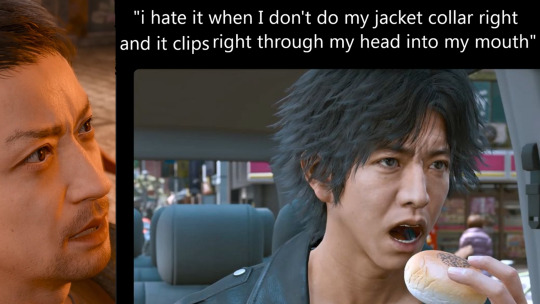
Didn't like the "detective boys punch school bullying revenge janitor" plot.
youtube
Previous video essay/transcript: Suzume Isn't Gay, But We Liked It Anyway
If you enjoy this essay, please consider following us here or on any other platforms, and/or donating to support future works via our Patreon or Ko-fi.
Patreon • Ko-fi • YouTube • Twitter • Cohost • Tumblr • Bluesky
Essay transcript:
All right, before we get started, here's the plot of Lost Judgment without all the twists. Oops, all spoilers! Oh, and also, quick note that this story deals with… or rather, invokes, the topics of bullying, suicide, bereavement, sexual assault, and of course, murder. We're gonna talk about some tropes, some themes, some ethics, and of course some casual sexism, too. Fun stuff! So. Here we go.
It’s 2008, and a student, Mitsuru Kusumoto, is being bullied at Kurokawa Academy, a Japanese private high school. His bullying is reported to his homeroom teacher, Yu Kitakata, by a classmate, Yoko Sawa. Kitakata, in order to collect evidence of the bullying, places a hidden camera in the classroom, and from this, obtains footage of several of his students bullying Mitsuru. The same day as this footage is recorded, Mitsuru attempts suicide. The suicide attempt fails and he falls into a coma which goes on to last thirteen years. Kitakata is fired as a result of this incident and later goes off the grid, changing his name and identity to “Jin Kuwana,” and branding himself as a local Yokohama handyman. Feeling guilty about having neglected to intervene in time, Kuwana subsequently plots to go about exacting his idea of justice on all the bullies who pushed their classmates to suicide. He approaches the parents asking if they’d like to get some real justice for their children, and then goes and kidnaps the former bully, and encourages the parent of the bullied child to murder them. The first such murder victim is Shinya Kawai, the one who bullied Mitsuru, and the first such murderer is Reiko Kusumoto, his mother and the Vice Minister of Health in Japan. He continues doing this for five years, amassing seven victims. To do this, Kuwana enlists the criminal accompliceship of Mitsuru’s other former bullies using the video that he recorded as blackmail material, and preserves Kawai’s body on ice to use as further leverage over them. In 2018, Akihiro Ehara sues Seiryo High School over the suicide of his son, Toshiro, who was bullied by Hiro Mikoshiba, a classmate of his. No substantive evidence turns up on account of tampering and obfuscation by the school board, and the perjurious testimony of Yoko Sawa, now a teacher at Seiryo, who is pressured into keeping quiet about the truth. As such, the case is dismissed. In 2021, Kuwana helps Ehara exact revenge on Mikoshiba. Ehara and Kuwana hatch a plot to make a public mockery of the Japanese justice system’s failures, which involves Kuwana posing as Ehara and staging a sexual harassment incident with the help of Yui Mamiya, one of Kuwana’s blackmailed ex-students, in order to furnish Ehara with an alibi for the murder of Mikoshiba. Ehara’s sexual assault case is taken on by defense attorney Saori Shirosaki, and two months later, the court declares Ehara guilty and gives him a six month sentence. As he receives his sentence, Ehara cryptically reveals the identity and location of Mikoshiba’s corpse. Shirosaki finds this suspicious, and contacts Takayuki Yagami, the protagonist of the Judgment games, asking him to sus out what in the heck is going on. Yagami and his colleagues deduce and uncover all this, with their detective skills. There is a conspiracy with a gang, Reiko Kusumoto’s political rivals, and a bunch of other people who they confront, indict, and/or beat up.
Ultimately, Yagami brings the truth about these murders to light, confronts Kuwana and beats him in a fight, and the story ends.
*cough cough cough*
Okay, um, now I don’t have to play along with this fucking Like an Ace Dragon Attorney twisty ass bullshit. I can now talk about the game without recapping the important stuff. That’s great. I think.
So, if you couldn’t tell, Lost Judgment’s plot is a tad unhinged.
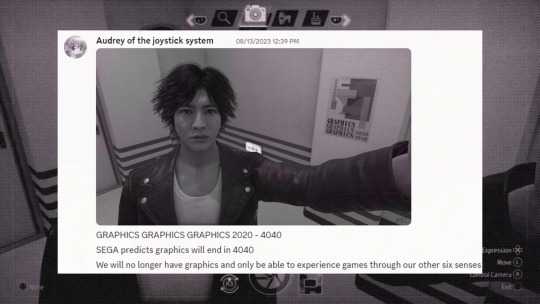
Okay so one minor note before we start: Lost Judgment has a little story DLC, called The Kaito Files, which could be very quite good, but it doesn’t look worth fifty (actually thirty) dollars. This video is not about that DLC. If I ever play the DLC, maybe I’ll make a follow-up video. If you think you might want that, back the Patreon, and maybe I’ll do it. Now then…
The first Judgment, developed by Yakuza series creators Ryu Ga Gotoku Studio and released in Japan in 2018 and elsewhere in the world in 2019, is a game that I quite enjoyed. It’s a Yakuza game, meaning it has the various trappings of Yakuza games that you might’ve heard about, from the distinctive free roam town slash real time action combat random battle gameplay to the wealth of activities and diversions you can do speckled all about, and also the plot, which is still at its core the sort of wildly implausible thrilling criminal conspiracy that you’ll be used to if you’ve seen any of these games to the credits.
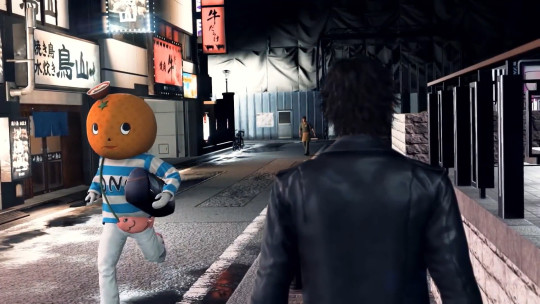
But it’s also a detective-themed game and a sendup of the mystery genre, meaning that its story is structured as a murder mystery, and there’s also some more detective-like flourishes in the gameplay loop, like interrogating witnesses or snooping around for clues. The story is fun, the detective stuff is fun, the game is fun. It’s also, quite notably for our purposes today, reasonably thematically cohesive.
If you’ve played any Ace Attorney game, you’ve seen this game’s basic thematic thrust: the justice system turns out skewed and often unjust results by imperfect people who make mistakes despite the best of intentions, as well as those in power trying to protect their good name, and it’s up to the law-dealing, truth-seeking protagonists to apply the law fairly and bring the truth to light. It’s Ace Attorney through a Yakuza lens, and that’s just a hell of a lot of fun. While there are some clumsily executed minor story beats, and some fumbled talking points, those don’t drag the game down significantly, and it is, nonetheless, a good time.

While I would overall recommend Lost Judgment to RGG veterans and anyone who really liked the first Judgment, I’d say that recommendation comes with reservations, because, oh gosh, that plot. It is much clumsier than the first game’s, much more thematically complicated, and rhetorically baffling. It’s also probably the most messed up scenario I’ve ever encountered in an RGG game, and that’s unfortunately not to its benefit, because the game really isn’t interested in engaging fully with the implications of this plot, and I think that’s pretty disappointing.
But before this story gets into the weeds, we do a cold open on a run-of-the-mill case for Yagami and his colleagues where you do a regular old Yakuza games tutorial, get to meet the characters, the parkour and stealth mechanics that this game introduces, and of course, the cats. This game is full of cats. Then we’re whisked away by the plot to do a first chapter case, where Yagami and Kaito are enlisted to help by their buds up in Yokohama who’ve been contracted to deal with a case of alleged bullying. Obviously the bullying is real, they help stop it, they all pat themselves on the back— and then the chapter ends with Yagami getting that call from friendly lawyer girl Shirosaki.
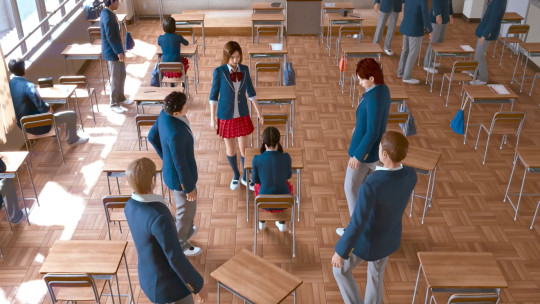
Before I continue, it’s important to note that the bullying of which this game’s story speaks is very much a real problem that plagues real life Japanese schools, and also that I don’t know shit about it. I am not Japanese, I have never been a student in a Japanese school, and I have no connections to anyone who ever has been. I’m a 24 year old transgender plural lesbian otaku failwoman from the US of A. I wasn’t even a student in any American schools, bar a few specific limited circumstances, as I was homeschooled. As such I’m pretty far removed from the cultural context and life experiences that might make this game’s story ring very differently to a Japanese player, or to anyone who’s been a victim of school bullying. So, I can only authoritatively comment on the topic of school bullying insofar as how much its invocation affected my enjoyment of this video game. In short, do your own research! Or, if you don’t, then just, assume that everything I say is true and don’t fact check any of it.
School bullying in Japan is infamously traumatizing, and often has tragically violent outcomes, the most well-known and oft-discussed of which is suicide. This is often chalked up to a few specific factors, namely the stifling routine and workload of school life, the cultural pressure to achieve harmony and not rock the boat, and school boards who have a vested interest in sweeping potential scandals under the rug.
sources: [1] [2] [3] [4] [5] [6]
It’s a pretty serious social issue, to put it mildly, and one that, like all social issues, has naturally come to attract satire. My favorite examples of such satire are the erotic horror visual novel Wonderful Everyday, or Subahibi, and the manga/anime series Sangatsu no Lion (March Comes in Like a Lion in English, but let’s just call it Sangatsu), each of which have a bullying arc.
Subahibi’s bullying arc is oriented as a revenge fantasy where the victims fight back against the bullies, presenting this violent resistance as a necessary and natural outcome of the cruelty of the antagonists and the impotency of the teachers (although, to avoid misrepresenting Subahibi, I should clarify that this subplot is a relatively short section of the game, and there is a lot more going on in it that is far beyond the scope of this video).
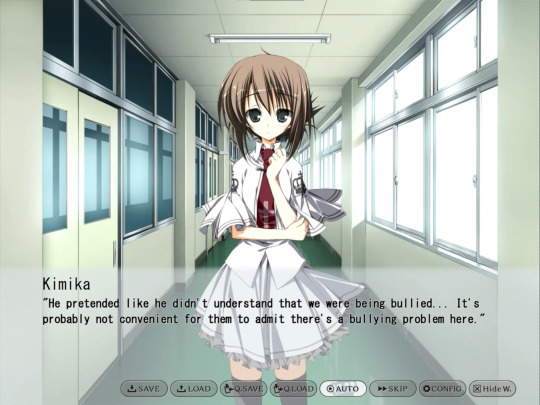
Meanwhile, Sangatsu takes a more down-to-earth approach that frankly discusses the nuances of the issue and has everyone involved more peacefully (and probably more realistically) confront the social causes at play. Both these works each focus effectively on one of these two angles, and do them well in their own ways, but Lost Judgment sort of awkwardly marries the realistic social commentary and the revenge plot, to the murder mystery, legal drama, to what I feel results in the detriment of both. Sangatsu and Subahibi, along with numerous other examples, are in my opinion far better at discussing this topic than Lost Judgment- though, once again, it bears reminding that I am saying this as a media critic, and not a sociologist. Do not believe me!
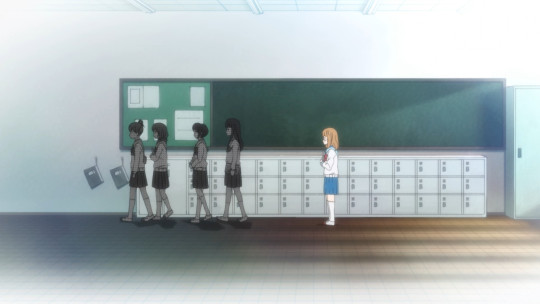
So, anyway, the first chapter of this game is a pretty straightforward case of solving bullying, and I have to say, I don’t really like it. If I had to put it in about a sentence, this opening chapter plot feels like all the parts of Persona 5 that people claimed to like, albeit forced into the framework of a Yakuza game.
If you’re wondering why I think this, well, RGG Studio and Atlus are both divisions of the game development branch of our beloved SEGA, itself a subsidiary of Sega Sammy Holdings, their friendly megacorp pachinko-churning parent company that they merged with in 2003, shortly after discontinuing the Dreamcast and leaving the console market, a thing no one mentions because it obviously didn’t affect anything because everyone still likes the video games! Mostly.
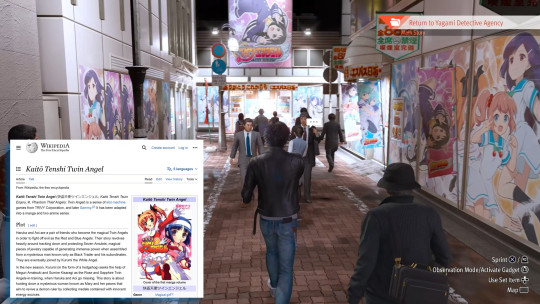
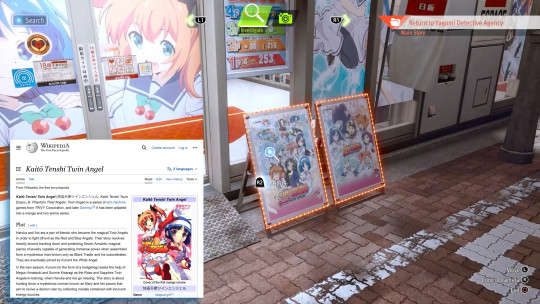
I’d hazard a guess that the different people making these games probably talk to each other. (I’m very certain that there was, at some point, an interview with an RGG developer that said this, but I cannot find this interview anymore (gosh damn, did I try), because advertising has gone on to make search engines worse. Or maybe I dreamed that interview up.) And given how Sega frequently boasts at the end of each fiscal period that their sales figures have been bolstered by both Yakuza and Persona, whose audiences definitely overlap (at least internationally), it only stands to reason that they would think that Yakuza can make some more of that Persona money by borrowing elements from the latter.
Whatever the case may be, this first chapter doesn’t work very well for me.
Firstly, it just makes me feel really uncomfortable, what with how Yagami and company go about placing hidden cameras and listening devices to spy on teenagers, something I find ethically suspect. The story never stops to consider if this is the most correct or appropriate thing to do, because we’re supposed to be on Yagami’s side since we know he’s got a good reason for it! There’s a girl who confronts him about it, Kyoko Amasawa the schoolgirl detective— literally the best character in the game, voiced by Xanthe Huynh, literally the best dub actress, in English. Amasawa is great, it's wonderful to hear Xanthe say such lines as
"This is your Reichenbach Falls Moment!"
But this conversation is just, she thinks Yagami is doing something malicious or perverted, she's wrong, he proves she's wrong, and the game never asks the question of, "okay, but, is it really fine to spy on teenagers even if one does truly have good and pure intentions in doing so?" I don't think it is, so, yeah, this whole plot point just makes me really uneasy. Like, I would not trust any adult with technology designed to invade the private lives of the children under their charge in the name of ensuring their safety. More often than not, that sort of practice is used to rob children of their personal freedoms, a thing that we as a society really like doing to children in the name of protecting them! In general! But that’s a whole other video.
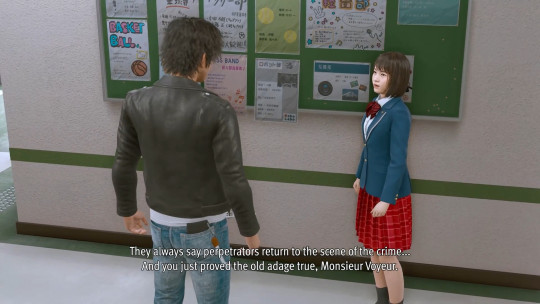
Anyway, that’s ultimately only a minor issue I have with the story, it doesn’t matter that much, and it’s done and over with quickly, so we can ignore it. Mostly. The bigger and more enduring issue is how the story goes about talking about bullying.
There’s two things that this game attributes bullying to, and those two things are hormone fluctuations and the bystander effect. Early on in chapter one, we get this dialogue about the hormones thing:
Tsukumo: Research shows that boys at that age experience a sudden spike in testosterone. This leads to outbursts to assert dominance, compounded by the irrationality of an immature brain. Scientifically, this potent mix of impulses often manifests as bullying. Kaito: Yeah, I call that puberty. Yagami: But that would apply specifically to boys, right? You're getting cases with girls involved too, aren't you? Tsukumo: Ah. With girls it's more likely rooted in oxytocin, a brain hormone that also has links to bullying.
So, I don’t know if this is true, and if so, to what extent. I did try to do some cursory research, but didn’t find any definitive answers. However, I am fairly suspicious of how this dialogue uses the scientific argument of the impact of oxytocin and testosterone on social behaviors to suggest that bullying is basically human nature, and especially in how it genders the two. “Oxytocin and testosterone make girls and boys, respectively, be mean” sounds like a rationale that is at best very reductive and at worst outright pseudo-scientific.
But, let’s just assume for the sake of argument, that it’s true. Alright, well, what about all the other reasons why bullying happens? Like, I don’t know, social and cultural pressures? For example, one character who appears in this game is Akane, y’know, the girl, who is in on the bullying for…
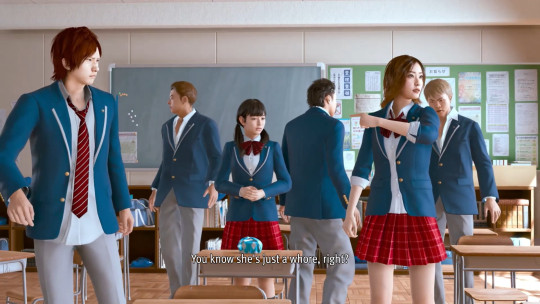
I don’t know why, actually. I don’t really know why any of these kids are bullying Koda. I mean, I do know why, they do tell Yagami what started the bullying, but I feel that that's a thing that's explained to further the plot, rather than a part of the story that is told. I don't have a great sense of what their social dynamic is, or why they all decided to bully Koda together, or, that they have any individuality really, beyond just... "Mean Kids 1 through 4."
But, given that Akane is like, the one girl in this group, I feel like there must be an interesting reason for that. Maybe she’s the leader of this clique who rallied all these guys to her cause, or maybe she joined them because she used to be Koda’s friend but felt like if she didn’t bully Koda with them, she might become a potential target. Maybe there’s some other reason! Maybe there’s other external reasons for all these kids to be bullying this girl. Maybe they just want her money, maybe they have a petty grudge against her, maybe they have an abusive home life, or maybe they’re just stressed and lookin' for someone to take it out on. Maybe it's all of these things between all of these kids. There could be all sorts of issues at play here, and I think it’s a huge missed opportunity that basically all the game has to say about it is:
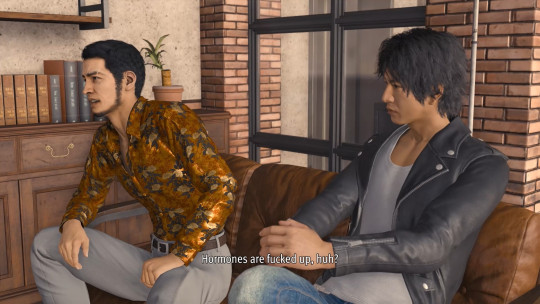
Kaito: Hormones are f**ked up, huh?
This isn’t a strict requirement for me to enjoy this plot, or find its perspective worthwhile. Like, you don’t need to empathize with antagonists. Sometimes you just want people to be mean so that you can feel good about them getting kicked in the face. That is basically the point of Subahibi’s bullying subplot, particularly the branch where Zakuro and Kimika fight back against Megu and Satoko and their, um, bullying friends—
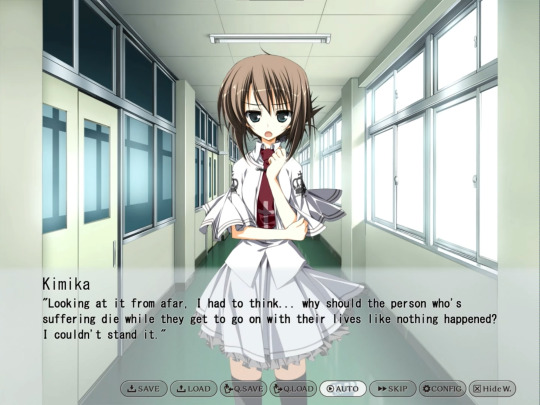
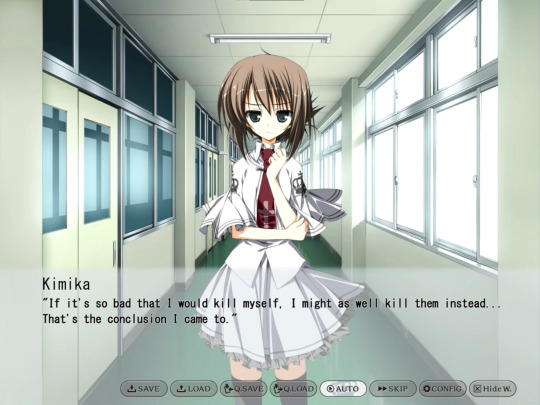
Kimika: Looking at it from afar, I had to think... why should the person who's suffering die while they get to go on with their lives like nothing happened? I couldn't stand it. If it's so bad that I would kill myself, I might as well kill them instead... that's the conclusion I came to.
(they do A LOT WORSE than bullying in the other branch. I can’t show you, it’s YouTube illegal and kinda disgusting)
I think that plot works precisely because it doesn’t justify the actions of their bullies. It doesn’t say that they’ve got the bullying hormones, it doesn’t try to make them sympathetic in any way, they’re just a bunch of mean bitches and we’re supposed to be happy when Kimika fights back against them. Similarly, in Lost Judgment, if they wanted to make these characters just mean, they could’ve just not said anything about the hormones! They could’ve just said these people are bullies, and left it at that! I mean, the Yakuza games up till this point have been doing just fine letting you kick random gangbangers in the face without telling you they’ve got the criminal hormones, and that was fun and we all had a good time!
But, because this game doesn’t go into any further detail about why bullies are bullies, it comes off pretty much like that. These kids have the bullying hormone. Is that their fault? I don’t know, but they’re pulling a knife on Yagami, so it’s fine to beat them up, I guess. The story does come back around to make the bullies sympathetic, when they decide to stop being bullies, apologize to Koda, and help Yagami, and that’s nice and cool and everything, and something that can also work without the hormones thing— like, for example, how it works in Sangatsu! Hinata’s bullies apologize, there’s a mutually amicable and peaceful resolution, and the story discusses and sympathizes with the broader social circumstances that pushed them to bullying, without condoning or excusing their actions. Like, maybe teenagers are just dumbasses who don’t always foresee their actions having consequences, or are afraid to change even if they do, and most people are just trying to do good at heart and will come around when they realize that their bad actions have negative consequences. I don’t know. It’s just a thought that there is!
Anyway, the story hasn’t got anything to say about the social conditions that might have led these kids to start bullying. It does, however, have a bit to say about the conditions that lead others to allow bullying to continue, and in this, the bystander syndrome is cited.
And this isn’t wrong! Although, I feel they don’t adequately address the potential social causes of this phenomenon. Like, for example, the cultural pressures to not do anything when you, y’know, have a life, and standing up to bullies might get you in actual trouble beyond just being embarrassed. Everyone we’ve talked to who’s either stood up to bullies in their time, or known someone who has, has spoken of being met with discipline or even expulsion even though they were the ones being aggressed. And in other contexts, standing up and speaking when you see a wrong being done could be met with violence or losing employment or legal repercussions or what have you.
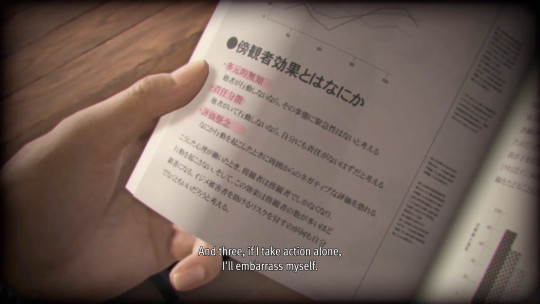
So, it goes beyond simple embarrassment, to say the least. We could probably, as a society, I imagine, be doing more to encourage people to not ignore injustices beyond just appealing to their moral sense. But that’s, also, a different video. Overall, I feel like this entire plot ignores the bulk of the actual systemic problems at play in favor of armchair psychology, which, hey, I guess I’m doing armchair sociology about a social issue that, while obviously not unheard of in my country, is very different from how it is in Japan. So it’s not as if I’m not guilty of talking shit about something I know nothing about.
Ultimately, this first chapter is just, like. Fine. It has a weird bit with spying on teenagers. It has a cheesy feel-good Hallmark Channel drama ending. There’s not much of a message to take from it, besides “well, it sure is good to stand up for others” which is very true, but also a rather shallow moral. With regards to how much it seems to borrow from Persona 5, I’d say that Persona 5 was at least very specific in explaining the social ills at play, how it affected the teachers, the students, the parents, the concrete reasons why it's easier for all these groups to stand by and do nothing, and was by no means above naming and shaming the individuals in power responsible for allowing the crimes to proceed. Sure, it goes about it in a very straightforward and teenage manner, without offering much more meaningful systemic analysis to speak of, but it does do it!
Conversely, Lost Judgment acknowledges the systemic issues: the students and their clique behaviors, the teachers who turn a blind eye at best and actively contribute to the bullying at worst, the school boards who try to hush up potential scandals, and makes someone stop in the middle of grieving to say DID YOU KNOW THAT IN OUR COUNTRY THIS HAPPENS THIS OFTEN,
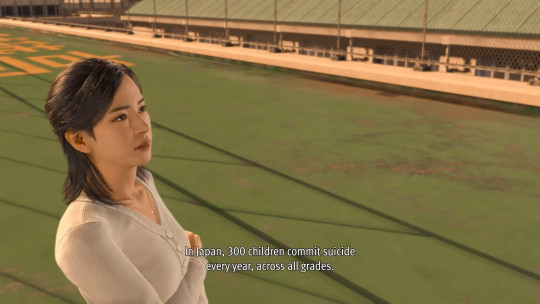
Sawa: In Japan, 300 children commit suicide every year, across all grades. Less than three percent are proven to be linked to bullying.
But while it points all of this out, it doesn’t analyze any of it beyond the most superficial of observations, and it certainly doesn’t take anyone to task. The tone it takes with all of that is more like, “well, who can blame them? Folks gotta keep their jobs.” It feels like it just doesn’t have the guts to blame anyone in specific, besides just “the system” and “human nature”, both things that are hard to get mad at, because, those things are the way they are! It doesn’t really have much of anything to say about why they are the way they are, or suggest those things could be changed, and thus no coherent solution is presented, besides encouraging individuals to lean into their better senses and just sorta going, “well, hopefully good people will make the system good.” …Which I suppose is, the same, thing that Persona 5 does… but… anyway… um, Sangatsu also does this part better
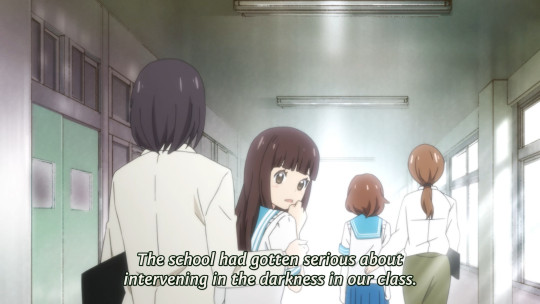
added interlude
Hi, editing Audrey here, and um. There’s one other probably sorta really significant critical difference I forgot to mention, and it’s that Lost Judgment’s plot focuses on the perspectives of adults.
Subahibi, Sangatsu, and Persona, in all their various plots about bullying and harassment, focus on the perspectives of victims. That is to say, the kids who are affected.
And, in what I originally wrote for this video, I spent a lot of time discussing how Lost Judgment is missing the perspective of the bullies, which it is, but I overlooked the perhaps even greater and more damning sidelining of the perspectives of the bullying victims. Like, we have Koda, who does get to say a small piece about how she just sorta put up with the bullying and then Yagami and company helped her realize how bad she had it, but then just talks about how she wants to play basketball, which is not something we care about, and then... is never really ever relevant, ever, again. Then we have Toshiro... who is already dead, and Mitsuru... who is also already dead (in a coma). And then we have seven other unknown bullying victims... five? Right. Yeah, five other unknown bullying victims... who Kuwana at some point took revenge for.
They're already dead!
And their voices are just not relevant, to the story, at all. Instead the story chooses to prioritize the voices of the people who, let’s not mince words, weren’t there for the kids when they should have been.
Not to say that the feelings of the teachers and parents aren’t worthwhile perspectives to include, but it does kind of brush aside their part of the fault for ignoring the bullying in the first place, and also doesn’t deign to inquire how the victims would feel, about an ex-teacher inciting their parents to Murderous Violent on their behalf. Unlike in Subahibi, where, the revenge is exacted by the actual victims of the bullying in direct self-defense against their immediate aggressors and then they stop once the bullies back off, in Lost Judgment it’s done long after the fact, by people who weren’t even the primary victims, and who really bear a lot more fault for not helping when they should have, and… really, that line of thinking puts this story in a really, really dark light.
Anyway I’m gonna just, stop now
end interlude
I appreciate the earnestness of this arc, the hopeful note that this concludes on. I think that the confidence and strength of this writing elevates this ending scene to the point where I at least don’t find it outwardly cringe. But overall, I genuinely just do not think that the Yakuza formula is equipped to deal with this kind of nuanced social issue where there’s specific problems and sides. We’ve seen this kind of fumbling before, in Yakuza 7 with illegal immigrants and sex work, in Yakuza 5 with idols, and now here, with bullying. The writers of these games seem to like gesturing at these sorts of things, and making a few genuinely salient statements, but ultimately their attempts to comment on these issues don’t work when they have to be crowbarred into the fantastic conspiracy plot in this manner. They just don’t have the sensitivity or sense or interest to write this sensibly with an eye towards actually acknowledging what the real issues and their causes are.
The events of the first chapter are relatively segregated from the main story, almost making it so that we’ve now had to play two prologues, and I’d imagine that it’s almost representative of this game trying to tell two completely different stories; the bullying drama, and the conspiracy drama, and the former doesn’t really get a chance to play out to its fullest and best, because it’s forcibly truncated by the game’s need to move onto the latter. Which I guess we may as well start doing ourselves, because gosh I’ve said entirely too much about this game’s first few hours. I hope y’all are prepared for me to list off everything that I do not like about this game that I do not like! Or, don’t like as much as I want to, at least. Maybe we’ll talk about that.
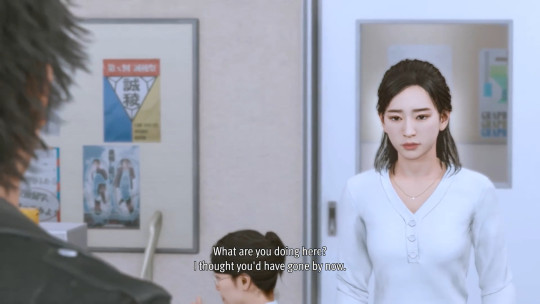
I think the role of Yoko Sawa, the teacher, in this game’s plot, is casually sexist to an exhausting degree. Big surprise, right? This is an RGG game, after all. Well, yeah, but more so than usual.
Sawa first meets Yagami when he's investigating Koda's bullying, and then gets to see a lot more of him when he keeps showing up at the school to investigate the main case. All throughout, she’s constantly telling Yagami to please stop talking to her.
I get that Yagami is a private detective and all, and he cares a fair bit more about solving this case and finding the truth than people liking him. He’s not a stalker or a criminal, he is a lawyer and he does to a point care about the law, but he’s also not the most straight-laced of characters, either, and he is willing to and does break a little law to achieve his goals, sometimes. To a certain point with him, the end justifies the means, so it makes logical sense that he would keep trying to get to Sawa-sensei, despite being told to fuck off, because Sawa-sensei is so frequently a lynchpin of the case. And, y’know, he does this with everyone! Yagami sure does do a lot of pressuring people into letting him interrogate them! So it’s not, like, out of character or anything.
With all that said— it really gets to me that Sawa is the person who Yagami ends up interrogating the most frequently, and thus the one who tells him to fuck off the most. At first, because she really doesn’t want to talk to him, and later because even though she’d maybe like to talk to him, she fears for her safety. And I’m just kind of like… okay… plot… why must Yagami go bother this poor woman again. She’s been through enough. Gosh.
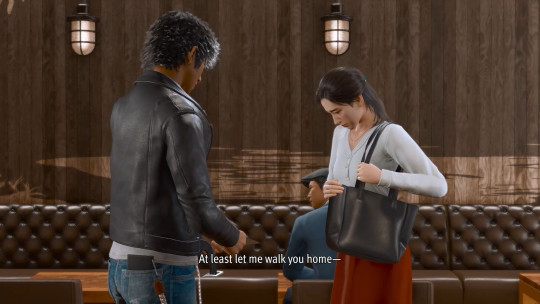
It super doesn’t help that one of the first things said about Sawa is that she’s hot? Like, Kaito says that she's hot, makes a pass at her, and Yagami’s like, “bro shut up” but, oh boy, they really wanted you to know she’s hot. And unlike Kiryu, who is a remarkably sexless protagonist throughout most of the series, Yagami fucks. Or seems to anyway. So that first impression of being told that this woman is hot, gives an entirely different texture to these later meetings with Yagami, where he, y’know, a guy, is repeatedly showing up like “hey please talk to me” and she, a woman, is like, “uh, no.” Oh boy, I love gender~
Yagami: I think you have the key to that answer, even if you don't know that you're the one holding it. It's like a lock. And until I figure out how to get through it, I'm going to keep picking at it. Sawa: I told you. I'm late for a meeting. Yagami: I'll be here when you get back. Have a good meeting.
And then Sawa dies!
It’s a pointless, cruel, and meaningless death committed by a gang boss to send a message. And that’s the point of it, yeah. It’s a death of an innocent to raise the stakes and show the villains mean business and all. I get it. I also fucking hate it. Like, it’s obviously fridging, yeah, but y’know, I’ve seen fridging. What I’ve also seen is a pretty recurring trope in the Yakuza formula, where RGG Studio just needs to kill off a woman to advance their plot. And that wouldn’t be such a bad thing, if not for the fact that women aren’t allowed to do anything cool or interesting in these games! I could make a video talking about that. I did make a video talking about that, and I got rid of it because it was bad.
Anyway. This worked better in Yakuza 4, 5, and 6, because at least there, the dead women had, y’know, relationships with the relevant playable characters that I found believable and credible and were built up enough to make it hit hard when they get killed off. And 6 gets points for revealing that the woman being killed off was a fakeout, and she's fine, because the goon that was supposed to kill her had a conscience, that's funny~
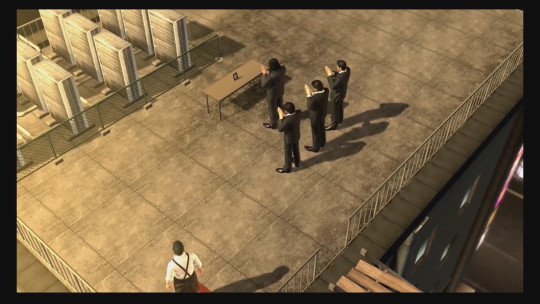
But like, Yasuko, in 4, for example! Or Lily. Whatever. Yasuko gets killed off in a similar way for a similar purpose, but it kinda worked there because they at least gave us reasons to care. Yasuko gets to move the plot and have some interactions with Akiyama, Saejima, Kiryu, and Tanimura. It feels justified when they all pray together at her wake. And, like, Akiyama has a thing for Yasuko, but it fits his character and he’s not weird about it, and it seems like Yasuko might reciprocate if not for the criminal underworld at her back, so, yeah. It’s still not great, and it’s kind of egregiously uncomfortable that Yasuko isn’t actually physically shown doing any of the interesting things she’s said to have done that got the yakuza after her, before she dies. Still, it makes sense. It’s, y’know, good, so long as you accept the fridge and its chilly embrace.
Sawa and Yagami in Lost Judgment don’t have this factor for me. When Yagami later continuously brings her up, saying that the killing of bullies needs to stop lest more innocents come into the crossfire, I can’t help but think “bro. you didn’t know her. she kept telling you to go away. why are you being weird about this woman you didn’t have a relationship with. she wasn’t going to fuck you!”
*laughs* yeah. Yeah, okay, I realize this isn’t funny. But like, that’s all I can really think! I know that’s not textually why he was talking to her, but it really does feel like that! I don’t know, it just feels like that! I do not like it!
So, yeah, that’s that thing. Another thing that’s stupid about this game! Y’know how earlier I mentioned that the antagonists stage a groping to fabricate a murder alibi? Yeah, that’s a twist. We go through a huge chunk of this game thinking that Ehara, an ex-cop, harassed some poor woman on a train. Then it turns out that the sexual harassment was fake. That the woman who was supposedly victimized was in fact in on it. I don't have another word for it. That's just stupid!
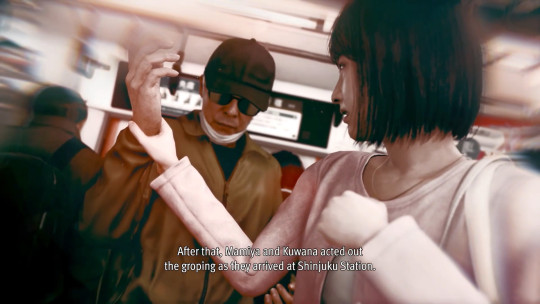
They could’ve salvaged that if, perhaps, they’d wanted to explore how Yui Mamiya was victimized in the course of being forced to play a part in a murder alibi. Then maybe they could’ve swung it, made the throughline about her being victimized, like, cohesive, somehow. But they don’t do that, and in fact, Mamiya just kinda, does nothing, for most of the rest of the game, after the fakeness of her sexual harassment is exposed. She tells them about the conspiracy and its motive, and how they staged the incident, and that’s kind of it. It’s kinda made way worse by that before they find out, Saori and Yagami go to interrogate Mamiya about the supposed harassment, and Saori mostly says a bunch of platitudes about how good it is that she came forward.
Saori: No, what you did was both brave and inspirational. Many victims are afraid to come forward for any number of reasons. Your voice might give them courage to find their own.
“You’re such an inspiration! -oh, you were faking it, to cover up a murder.” This just feels deeply ill-advised, and, I imagine, like this particular game really wanted to work sexual assault into its plot to feel like it’s tuned into the zeitgeist, to make that Persona money, again. But Lost Judgment has nothing to say about the topic of sexual assault. It’s simply a prop in the murder mystery. This plot twist could’ve worked just as well with anything; Ehara and Kuwana could’ve faked any number of petty crimes to furnish him with an alibi, like, mugging, or shoplifting, or vandalism, or pulling a knife, or whatever else, and the writers chose this one.
And, adding to the absurdity of this plot twist is that Ehara is said to have been a cop, which, is never really relevant besides explaining away why he got such a slap on the wrist for the sexual harassment charge. But that's just hilarious, also, that the story exchanged "cop sexually assaults woman on train," a curiously specific and highly plausible chain of events, for "woman faked sexual assault to help cover up a murder," which is, of course, far less likely.
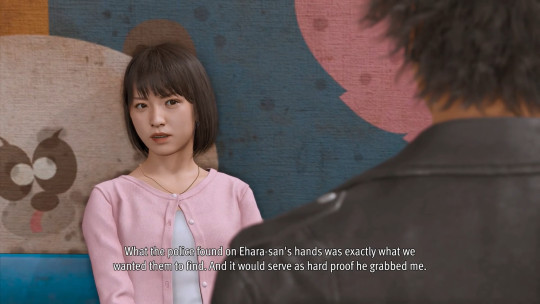
I’ve got a funny anecdote about this one, actually. In the mystery solving dialogue where Yagami draws this conclusion, you’re asked to select it from a dialogue wheel, and I looked at that and was like, “no. no. no. fuck noooo” and selected every other option. A friend of ours, who watched us play most of this game, commented that the various dialogues about the wrong answers made it feel like Yagami really didn’t want that to be the answer, to which I said, “yeah, I don’t want that to be the answer either!”
Another thing that bothers me about this part is that, when Yagami and company deduce that Mamiya is an accomplice, they also deduce the thing with Kuwana using the bullying footage to blackmail her. When they learn of this particular means by which Mamiya was victimized, they… use the bullying footage to blackmail her. This in itself wouldn’t be a bad thing, if it didn’t feel like the game twisting the knife on that they really don’t care how she’s been victimized.
I can’t help but feel a little sorry for Yui Mamiya, overall. This reads like an absolute nightmare scenario to me. You were mean to some other kids in high school, like a lot of kids are. Maybe you were pressured into the bullying, maybe you had a difficult life, maybe your parents abused or neglected you, maybe whatever. Your actions have some unforeseen negative consequences, but you get on with your life because you can’t let that guilt destroy you, and then almost a decade later, long after you’ve moved on, your old teacher shows up at your doorstep and blackmails you into becoming an accessory to murder.
There’s a lot of people in the past who we were mean to as a kid, as a teen, even, once or a time another, when we didn’t yet know any better, and like, the thought of something from that long ago, coming back to bite us? Someone showing up at our door to say they hate us for that, let alone trying to blackmail us over it? That’s fucking terrifying.
And the fact that the game doesn’t consider this entire plot development through the lens of Mamiya being a victim, and being retraumatized by Yagami making her go through this all over again, it’s… it feels like a pretty big narrative oversight.
The same can be said for her other classmates, as well, who are also being blackmailed by Kuwana in the same way, and similarly thrown under the bus by the story, albeit without the sexual assault thing. But, they have much less screen time than Mamiya— and they're all guys, so I naturally have less to say about them.
It just bugs me, in general, that like, the story never questions the notion that these people deserve some kind of comeuppance for bullying a child to suicide over a decade ago. Is encouraging a suicide tantamount to murder? Especially when the ones doing it are a bunch of teenage dumbasses? I don’t have any definitive answer to that question. Your own opinion will depends on your sense of ethics and perspective on the issues of bullying and suicide, and those could be radically different from mine. Legally, it’s a very muddled question that would be answered very differently in different courts at different times with different case contexts.
source: [7]
But personally, if I had to draw a line, I would say, no, bullying someone to suicide isn’t tantamount to murder. And the reason why is because, I think, if we were to say that that was the case, then where does that stop? How do we measure what actions caused someone’s suicide, and whomst of the actors are more guilty than others? Is the teacher responsible for their death, not having noticed or taken action on the bullying? Are the students who stood by and did nothing responsible? Does being a bit mean to someone who later kills themselves mean that you might’ve pushed them over the edge and could therefore be culpable? Or are we to say, no, none of that makes you guilty, and take the other extreme position, being that no one can be guilty of causing their suicide unless they physically coerced the victim to jump off of the roof? But even in that case, how do we decide that they really meant it?
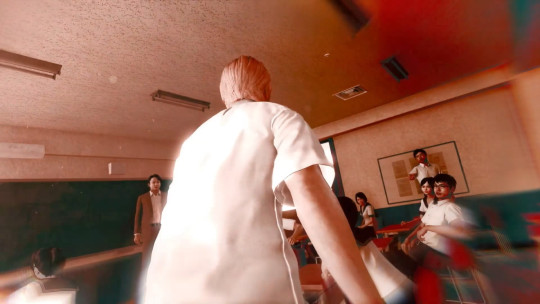
I genuinely do not know, but I would say at some point after enough time has passed, it’s really not worth punishing anyone. I don’t know if y’all’ve noticed, but I consider myself pretty left-wing, and as a necessary result of that, I don’t particularly believe in punitive justice. I don’t think people should be sentenced to death, and I don’t think people should go to prison. This isn’t to say that I think that someone who bullied a child to suicide is blameless, or that they should face no consequences, but unfortunately our society isn’t particularly equipped to deal with this kind of thing in a healthy way, that would actually be meaningfully reparative. All that the system, and thus most people, can conceive of, is punishing individual wrongdoers.
Sugiura: “well, all you kids tormenting mitsuru looked pretty psychopathic to me” Mamiya: “oh, and YOU’RE so perfect? an angel who never once acted out of line? Never lashed out at someone weaker than you? Or sided with the group to shut someone out? Everyone does it! We were just ‘lucky’ enough to have some creep tape us picking on some kid who couldn’t take it! Why did this have to happen to me…?” Yagami: “I’d say it’s because bad things happen to bad people.”
At this point during my initial playthrough, I paused the cutscene, and let out a beleaguered and tired sigh.
Mamiya is obviously being a little hysterical and all, but like… she has a point. She isn’t wrong. As much as she and her friends did to hurt Mitsuru as teenagers, the chain of events she describes sounds horribly traumatic in itself. Her teacher, lying in wait with the evidence of bullying for nearly a decade, so that he could come around and hold that over her head. That’s legitimately fucked up. Did she deserve this? Does this fix anything? Sure, it doesn’t seem like she or any of the others particularly regret their actions, but even still— Is it worthwhile to punish her for the rest of her life for this, especially so long after the fact?
But the story just dismisses all of those questions with that line. Of course she deserves to get punished. She’s a bad person. And that’s it. The issue that the story ultimately takes is with Kuwana’s methods of blackmail and serial murder, and even then, it doesn’t say that it’s because it’s not effective, but rather because it’s outside of the justice system.
And that’s, y’know, kind of expected, given that this video game is, in part, a murder mystery pastiche, particularly of Ace Attorney. A game series that I like, despite the fact that every episode of that series necessarily ends with the true murderer being exposed in court, arrested, and sent to prison. Things that I necessarily do not agree with, because I disagree with the existence and function of the institutions of the courts, the police, and the prisons, but hey, you get what you sign up for when you wanna have a good time with the detective-lawyer game about exposing the real murderer and sending them to prison.
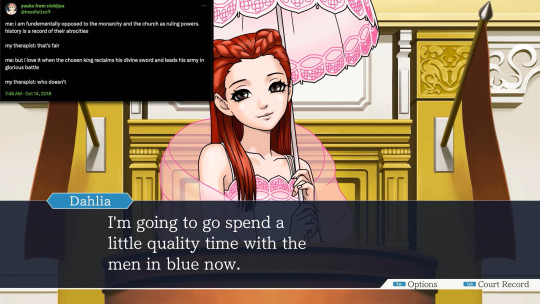
[https://twitter.com/headfallsoff/status/1051484419251425280]
That Lost Judgment goes so far as to say, whether deliberately or by oversight, that someone is still guilty of something they did thirteen years ago as a dumbass teen who wasn’t mature enough to foresee the consequences of their actions… it bugs me. So.
Anyway, the other thing I have to criticize, is just, Kuwana, or more specifically, the plan he has.
I just think it’s stupid. Both in the sense that obviously it doesn’t actually do anything to stop bullying, and also I don’t think I see what it actually illustrates about, y’know, the thing the game purports to be about. It’s not really bad exactly, I mean, obviously this game was going to revolve around catching a murderer, and Kuwana, sure is a murderer, or murder instigator if you wanna be technical, and he sure is a villain in this pulpy murder mystery conspiracy story.
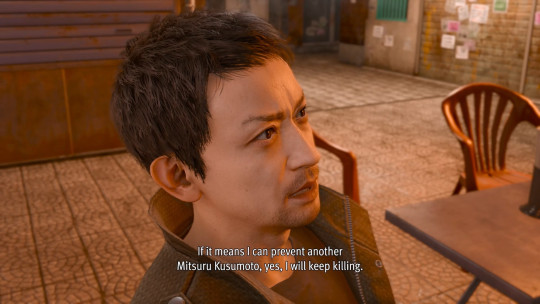
I just don’t get why that story needed to be about bullying. I don’t get why it needed to be about sexual assault. It isn’t really about bullying or sexual assault, it just uses those topics as props in the murder mystery. By the time we find out what Kuwana’s motive is, the game has stopped being about bullying since about, like, between 15 and 30 hours ago, and it just feels, meh. For all the reasons I’ve kind of already said. I do kind of like how Kuwana is sort of positioned by the story as something of an anti-hero, and got hella charisma, I wanna like him. Given that I think both sides are wrong here, it’s. Y’know.
From then on the stuff that happens is just, yeah, conspiracy, fights, and then exposing the truth in court, and all of that’s entertaining and everything. All the normal things that I come to Yakuza games for. I mean, I also come to them for the thematically rich narrative wrapped around this hokey action crime plot, and that feels pretty thin in this game.
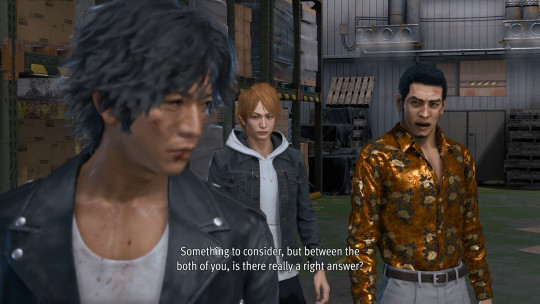
Again and again over the course of its 40 odd hour runtime, Lost Judgment loses the plot. Or rather, gives ultimate precedence to its plot, at great expense to its themes. All of the remotely worthwhile or interesting ideas that it hits on aren’t developed, all just kinda fall by the wayside in favor of these three rather trite, formulaic talking points: That the law isn’t perfect but people need to try their best to do the best they can with the system anyway, that vengeance is hollow, and that you should stand up for others. And, that’s what there was to take away from the first Judgment. And in that game, it was fine, because that story was mostly just a fun time and didn’t exhibit any significant aspirations to say anything else. It might have been fine in Lost Judgment, too, if not for that this story’s subject matter felt like it wanted something else. Something more specific and nuanced. But instead, its purported themes are left feeling like interchangeable plot devices, the fun core of this murder mystery muddled by the question of
“why? and what was the point?”
I mean obviously the point was for people to buy the game, but, other than that… who knows. who can say.
So, all the stuff I said is, genuinely, what I figure I probably believe. Probably. But, it bears clarifying, I still like this game. It wasn’t trying, necessarily, to be super deep or thought provoking or politically accurate. I’m sure the creators see it as a nice bonus if it’s seen as such, but its ultimate goal is to, y’know, be a game that’s fun to play with a story that’s fun. And I think it is! I think there’s a lot of things in it that are fun and good. There’s honestly too much that’s interesting and good about the optional content of this game, which, is the case with every Yakuza game, but that’d require a whole entire separate video, and, maybe we’ll make that video. I don’t know.
I don’t think borrowing from Persona is necessarily a bad thing. In fact, I think there’s a hell of a lot of potential for good in doing that! Like, Persona’s appeal, to a lot of people, is the exaggerated school life mystery thing, but it’s somewhat stymied by its need to be an SMT game, because it is. I’ve heard a lot of people say that they really don’t like how Persona 5 ends with them fighting the huge anime god, because that’s just such an absurd and nonsensical escalation of a plot that starts really serious and realistic.
The Yakuza games are very similar in structure to a JRPG like SMT or Persona, but their “huge anime god” is just “a regular guy who’s in charge of the conspiracy,” and that’s also an absurd power fantasy and all, but it’s a more realistic one that makes more sense with that kind of story. Y’know, if they want to focus on a high school setting again, maybe have a teenage delinquent as a protagonist— which, I guess they already sorta did in Kurohyou, but, y’know, if they wanna do that again. That could be cool.
So! Yeah! Lost Judgment's not totally wasted time just cause its main story is kinda weird and bad. It's at least hella interesting. And, with that, I want to talk about another way we could possibly look at the main story.
About two thirds or so of the way through the story, Yagami gets an audience with Reiko Kusumoto, the mother of Mitsuru, the bullied child whose suicide attempt started Kuwana’s murder instigation spree. She tells Yagami about the events that led up to her murder of Shinya Kawai, how he didn’t even recognize her or seem to regret anything he’d done, and that pushed her to kill him, a thing she states that she doesn’t regret in the slightest. And I wondered,
… shouldn’t she regret that?
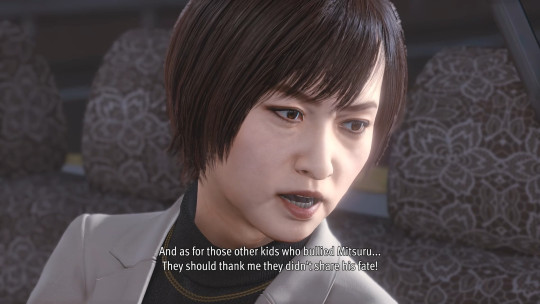
I mean, basically, all the stuff I’ve already said. I’m not sure if this situation warrants murder, or furthermore, if it’s really realistic or interesting to depict the parent of a victim as desiring revenge like this. There’s a significant contingent of friends and families of murder victims whose murderers have been placed on death row who advocate against the death penalty, so I don’t figure it’s unthinkable to suppose maybe some parents of children who died to suicide don’t actually want revenge on the people who pushed them there. And maybe the story could’ve acknowledged that possibility, and that might’ve been something, but also, maybe that wouldn’t have gelled with what it was trying to do.
If someone is placed on death row for murder, the feelings of the victim’s families don’t matter. They can say they would rather not see the murderer killed, and the state will still execute them anyway. So, aren’t they, kind of, in the same position? Where they don’t get to have any meaningful hand in deciding what justice would be, and the state holds a legal monopoly on exacting violence, and choosing when and where it’s appropriate to do so?
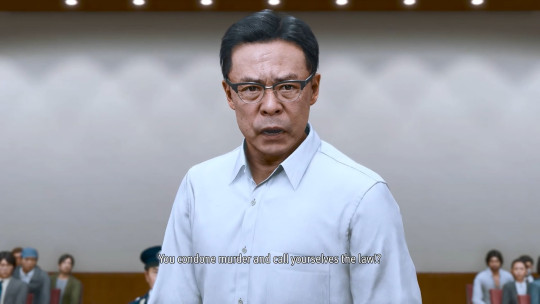
I mean, I, as some sort of dumbass anarchist, would say the state is pretty definitionally illegitimate, and that the monopoly on violence they hold over the populace is unjust. As a general rule, I don’t like violence, but I’m also not a pacifist, and I’d say sometimes that violence is maybe necessary… although in a case such as what’s depicted in the game, I’d say that death is a pretty unjustified response, but.
Is that something that matters to the families of the bullying victims? I don’t really know what it’s like to lose someone close to you to suicide. I especially don’t know what it’s like to lose a family member to suicide as a result of bullying this cruel. So, maybe some people who have experienced that would feel that that is justified, or at least fantasize about this sort of revenge. I mean, even despite my stated politics (you can correctly guess I oppose the death penalty), I can’t claim like I’ve never had thoughts like this. Statistically speaking, most people do!
I may not know people who’ve endured bullying specifically in Japan, but I do know people who’ve been bullied. Some of those people know, or knew, others who attempted suicide as a result of bullying and negligence by the school they went to. Some of those people, actually, a lot of those people, scratch that, all of those people, are queer. (Almost everyone in our social circle is queer.) If they’re angry at, and feel vengeful towards, those who’ve bullied them, or their friends, or just people who bully others to the point of suicide in general, then I don’t think I’ve got any right to criticize them for that. I believe their anger is justified, and I don’t think I’d be able to fairly criticize them for acting on that, or, thinking about acting on that.
And if nothing else, this story definitely does focus a lot of attention on the grief and anger that these game’s antagonists feel, and it cares a lot about portraying that effectively. It might be that this game is actually a really emotionally potent picture of that anger that resonates really well with people who’ve been in that situation and felt that way, and I’m just not one of those people.
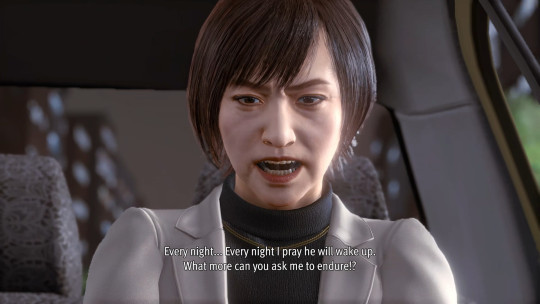
So maybe in that sense, Lost Judgment is in its own way an emotionally honest depiction of how bullying in Japanese schools affects people that couldn't come from something more considered and careful in how it discusses these issues. And maybe that’s good. And I just don’t see it.
But my eyes aren’t the only ones.
Thanks for watching this, this was really hard to write, but, I guess I did it, so, yeah. I’d appreciate getting thrown a few dollars on patreon or ko-fi. And also subscribe or like or whatever, share the video to whatever social media platform you use. Anyway, the important names are:
Patreon credits: Ada. Just Ada - Anime Omelette - ASabitsukiFlow - Azu - ColorfulCast - dameDiadora - deeso - Duskpixie - Elvenoob - Emma R - Femboy Bebop - Good Civilization - Gwen Starlight - hev - Kaylee Smerbeck - Korin - L Tantivy - LaLaLacuna - Lilly - M - Mira Yeuden - Nik Gothic - Pigeon - Roger C Walker - RukaCollie - Sally - Saoirse Russell - Scimitar - SimplyAero - SleepySlug - Spiderrebelnews - Thijs - Trucy - Vile Lasagna
Aaaand bye.
#lost judgment#judgment#video essay#going to make this 'public' tomorrow morning#but in the meantime#it is unlisted#and I will just reblog it later#yakuza#ryu ga gotoku
23 notes
·
View notes